
2023-2024
Lower Primary School Parent Handbook
Mission
Dedicating our minds to inquiry, our hearts to compassion, and our lives to service and global understanding
An American-style education grounded in the Christian faith and respecting the spiritual lives of all
Vision
HKIS will be a leading place of learning that inspires a socially engaged community of collaborative, creative, and resilient learners dedicated to realizing their full potential.
Values
Safe, kind, respectful, responsible
Student Learning Results
Academic Excellence Students will achieve their intellectual potential by striving for and attaining the highest standards of academic excellence.
Spirituality
Students will understand and respect Christianity and other religions and will identify and develop their own spiritual identity.
Character Development
Students will demonstrate respectful and caring attitudes at school and in the community, as well as the courage to stand up for what is right.
Self-Motivated Learning
Students willingly apply a variety of learning and motivation strategies throughout their learning process.
Contributing to Society
Students will develop the skills they need to form genuine relationships in our diverse society and to make contributions to our community.
Chinese Culture
Students will gain an understanding of China and an appreciation of the Chinese Culture.
Welcome Letter from the Principal
2023-2024 School Year
Dear Lower Primary School (LPS) Families,
Welcome to the LPS at HKIS! We are so pleased that you have chosen to be part of our exciting community. Through play, inquiry, collaboration, and creativity, our goal is to create a joyful environment and a student body who loves learning.

We are truly looking forward to the 2023-24 school year as we welcome our new families to the division. I think you will find the LPS to be a caring and compassionate environment where students feel safe, supported, and valued as they take ownership of their own learning. We have a dedicated and passionate faculty and staff who endeavor to make social-emotional and academic learning authentic, challenging, fun, and engaging.
The home-school partnership is incredibly important to us as a school. This handbook will help guide you in that partnership and support your child as they begin or continue their learning journey. I highly encourage you to explore our philosophies and approaches to teaching and learning as they will help you understand why we facilitate learning in a particular manner. In addition, our policies and procedures section around busing, inclement weather, absences, our values (4 Bees), and other day-to-day operations is a useful resource to help you understand how the Lower Primary operates.
Throughout the year, the two main formats for receiving information about what is happening in school will come from your child’s homeroom teacher’s blog, which is updated regularly, and the Lower Primary School newsletter, emailed to you every Monday. Between these two sources, you will learn what curriculum is being covered in class, what is happening on campus including upcoming events, and other useful information, such as tips for supporting your child at home.
On behalf of the entire LPS Faculty and Staff, we welcome you all to the 2023-24 school year. We look forward to the classrooms and hallways being filled with laughter, creativity, curiosity, wonderings, and collaboration!
Wishing you all a wonderful year ahead!
Geoff Heney Gayle Renken Andrea Strutin Lower Primary Principal Associate Principal Associate Principal
Please note the following important dates for your 2023-24 calendar:
Hopes & Fears Conferences:
R1 & R2 August 11 & 14
G1 & G2 August 14-15
Parent Coffee:
R1 & R2 August 15
G1 & G2 August 17
Back-to-School Night: August 24
Our Core Values The Four Bees Safe Kind Respectful Responsible Lower Primary Parent Handbook 1
Hong Kong International School Lower Primary Administrative Team
Geoff Heney Principal gheney@hkis.edu.hk

Andrea Strutin
Associate Principal astrutin@hkis.edu.hk
Gayle Renken


Associate Principal grenken@hkis.edu.hk
Lower Primary Office
Yvette Tang
Karen Ho
Angela Gan Executive Secretary Secretary Secretary Tel: 2812 5133 Tel: 2812 5131 Tel: 2812 5130 ytang@hkis.edu.hk kaho@hkis.edu.hk agan@hkis.edu.hk
Health Office
Tracy Chow
Christine Liu Nurse Nurse
Tel: 2812 5117 Tel: 2812 5117 lpsnurse@hkis.edu.hk lpsnurse@hkis.edu.hk
Bus Coordinator Bus Company
Food Supplier
Kenny Chu Kwoon Chung Motors Sodexo Tel: 2812 5119 Tel: 2578 1178 Tel: 2979 8798
Mobile phone until 6 p.m. 6086 1143
Hong Kong International School Lower Primary School
Unit.hkislp.HK@sodexo.com
23 South Bay Close, Repulse Bay, Hong Kong • T +852 2812 5000 • F +852 2812 5291 www.hkis.edu.hk
2 Hong Kong International School
Background of Hong Kong International School 5 Lower Primary Philosophy Statement 5 The Religious Dimension of our Program 6 Language Policy Across the Curriculum 6 HKIS Communications 7 HKIS Community Expectations and Communication Guidelines 7 Working in Partnership 7 Addressing Disagreements 8 Harassment 8 Communication Between Home and School 10 Discussing HKIS on Social Media 11 HKIS Marketing Office: Stories & Snapshots 11 Advertisements 11 Problems and Concerns 11 Learning and Growing in Early Childhood: The Educational Program 12 Organization of Grades in Lower Primary 12 How Do We Teach Academics in the Early Years? 12 Literacy 12 Mathematics 12 Religious Education 13 Social Studies and Science 13 Educational Technology 13 Specialist Classes 14 Art 14 Chinese Studies 14 Music 17 Physical Education 17 Assessing Student Learning 18 Reporting on Student Learning 19 Student Services Team (SST) 20 SST Objectives 20 Social-Emotional Learning and Counseling Program 20 Library 21 After School Activities 22 School Policies and Procedures 23 Enrollment 23 Grade Placement 23 Withdrawals 23 Orientation and Hopes and Fears 23 Student Life 23 Birthdays 23 Cafeteria, Snacks and Lunches 23 Field Trips 24 Home Learning in Lower Primary 24 School Supplies and Backpacks 25 Six-Day Schedule 25 Tutoring 25 Uniform 26 Accessing the School 27 Busing 27 Bus Supervisors 27 Changing Buses 27 Enforcement of Bus Rules 27 Mandatory Busing Policy 27 Safety Rules for All Bus Riders 27 Transportation to School 28 Rainy Days 28 HKIS ID Cards 28 Parent Volunteers and Visitors in Lower Primary 30 Parking 30 Phoning HKIS 30 Picking Up Students During the Day for Special Circumstances 30 Weather Warnings Procedures 30 Health and Safety 32 Behavior and Discipline 32 Four Bees 32 Health Office 32 Nut-Aware/Nut-Free Policy 35 Pets in School 36 Phone-Free Zone Policy 36 Safety and Accidents Procedures 36 Disruptions to School Operations and Virtual Home Learning 37 Parent Involvement 37 Gifts and Entertainment 37 Parent Groups 37 Parents’ Presence in Hong Kong 38 Separated or Divorced Parents 39 Student Attendance and Absences 40 Personal Property 40 End of Year Check Out Procedures 40 Labels in Clothing and Other Belongings 41 Lost and Found 41 Valuables/Toys 41 Appendices HKIS Shared Philosophy of Education 42 SLR Operational Definitions 43 Learning Principles and Practices 46 Teaching for Understanding 47 Philosophy of Assessment 48 Six-Day Schedule Inside Back Cover
Lower Primary Parent Handbook 3
CONTENTS General Information
Literacy Guide for Parents
Math Guide for Parents
Heroman, C. Jones, C. 2010. The Creative Curriculum for Preschool Washington DC: Teaching Strategies.
Neuman, Susan B., Carol Copple and Sue Bredekamp. 2002. Learning & Read and Write: Developmentally Appropriate Practices for Young Children. Washington, D.C.: National Association for the Education of Young Children.
Fountas, I. and Gay Su Pinnell. 2011. The Continuum of Literacy Learning. Portsmouth, NH: Heinemann.
Hill, B.C. 2001. Developmental Continuums: A Framework for Literacy Instruction and Assessment K-8. Norwood, MA: Christopher-Gordon. Common Core State Standards. 2010. www.corestandards.org/ ELA-Literacy/.
Calkins, L. 2013. Units of Study for Primary Writing. Portsmouth, NH: Heinemann.
Wood Ray, K. 2006. Study Driven. Portsmouth, NH: Heinemann.
Calkins, L. 2015. Units of Study for Primary Reading. Portsmouth, NH: Heinemann.
Glover, M. 2009. Engaging Young Writers. Portsmouth, NH: Heinemann.
Fountas, I. and Gay Su Pinnell. 1996. Guided Reading: Good First Teaching for all Children. Portsmouth, NH: Heinemann.
Contributing Authors: Bonnie Campbell Hill, Madeleine Maceda Heide, Ann E. Freeman, Maggie Moon, Ben Hart, Nate Dennison, Jill Kaufman, Denise Dyette, Francesca Cecchi, Margo Sommerlad, Laura Chesebro
For additional information on Bridges in Mathematics Program – The Math Learning Center (http://www.mathlearningcenter.org/bridges)
For additional information about the NAEYC standards (www.nctm.org/standards)

For additional information about the National Council for Teachers in Mathematics – NCTM – http://www.nctm.org/
For additional information about the Common Core Mathematical Standards – http://www.corestandards.org/Math/
Contributing Authors: Quynh Nguyen, Denise Dyette, Sam Soranson, Sandy Atkins
Reading & Writing 50 Key Skills for Success in School 50 Literacy Curriculum in the Lower Primary 51 Research-Based Literacy Instruction 57 Reading and Writing Workshop and Its Components 58 Keys for Success in Reading and Writing 59 What the Research in Early Literacy Says 59 Reading and Writing Development 59 An Ongoing Continuum 59 Preconventional 60 Emerging 61 Developing 62 Beginning 63 Expanding 64 References:
Math Curriculum in the Lower Primary 67 HKIS Math Philosophy 67 Five Strands of Mathematical Proficiency 68 Standards of Mathematical Practice 69 Reception 1 Overview 70 Reception 2 Overview 71 Grade 1 Overview 72 Grade 2 Overview 73 Researched-Based Instruction 74 Bridges in Mathematics 74
References:
4 Hong Kong International School
Background of Hong Kong International School
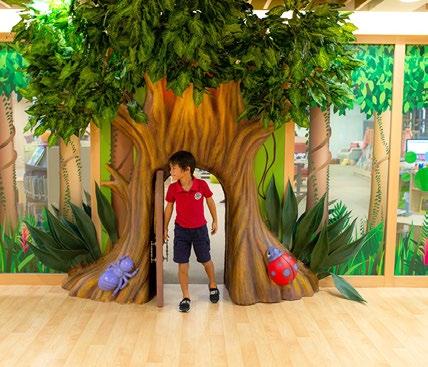
Hong Kong International School (HKIS) first opened its doors in Repulse Bay to 630 international students on September 14, 1967.
From humble beginnings, HKIS has expanded to cover two sites with Lower Primary and Upper Primary based in Repulse Bay and Middle and High Schools based in Tai Tam.
Employing more than 500 faculty and staff from Hong Kong and around the globe, HKIS provides an American-style education, teaching a wide and varied curriculum that encourages personal as well as academic growth. HKIS is one of the leading international schools in the world.
HKIS places understanding of China and appreciation of the Chinese culture at the core of its learning. The school prides itself on remaining at the cutting edge of academic excellence, with a highly-qualified and specialized multi cultural faculty.
HKIS SAT scores are consistently above the US national mean. Students graduating from HKIS attend many of the best universities in the world.
Lower Primary Philosophy Statement
Our practices in serving children and families are based on our commitment to certain fundamental values, rooted in the history of our profession and grounded in the Christian faith. Our work is guided by our school’s Mission Statement and the six Student Learning Results, which we help our students strive toward.
What Core Beliefs Do We Have About Children, Families, Teaching and Learning?
We appreciate childhood as a unique stage of the human life cycle. We value the quality of children’s lives in the present, not just as preparation for the future.
Our work with children is based on an ever-growing body of knowledge of child development and learning. We appreciate and support the close ties between a child and his or her family. We recognize that children are best understood in the context of family, culture and society. We respect the dignity, worth and uniqueness of each individual child. We aspire to help children and adults achieve their full potential in the context of relationships based on trust, respect and positive regard.
How We Make Our Core Values Evident in Our Environment
n We believe that all children are competent and capable individuals who have a natural curiosity for learning. We believe that a positive experience during the early years of schooling has a profound effect on self-worth and future attitudes towards learning.
Therefore, we foster a child’s basic disposition to investigate and to make sense of their experiences, to teach them to care about and relate to others and to nourish their social, emotional, spiritual, physical, aesthetic, cultural, linguistic and intellectual development. We affirm the value of play and social interaction as a key learning medium. Within our active program of learning, children engage in concrete experiences that enable them to build on their existing knowledge and develop dispositions for life-long learning such as creativity, perseverance, care and responsibility. Through a balanced program of teacher and student initiated learning, children interact with others to acquire skills that enable them to develop their interests, solve real problems and communicate cooperatively with others. We provide opportunities for children to be curious, to wonder, to ask questions and to learn from others. We encourage children to marvel at nature, to develop a sense of spirituality, to acquire an understanding of heritage and to make connections about the world.
Lower Primary Parent Handbook 5
n We believe that teachers actively contribute to each student’s learning through their expectations, teaching strategies and commitment to learning. Therefore, we have high expectations of students and scaffold learning to support increased levels of understanding, consistent with developmentally appropriate practice. We regularly assess student learning and modify our instruction to match children’s needs. We support children’s sense of self and growing awareness of their abilities by establishing a positive environment in which student’s efforts are valued and recognized. We guide and monitor student behavior and use appropriate methods of discipline.
n We believe that parents have a critical role in contributing to their child’s self-esteem and learning.
Therefore, we encourage parents to be involved in their child’s learning both within school and at home, we regularly communicate with parents in various ways about our program and about student progress.
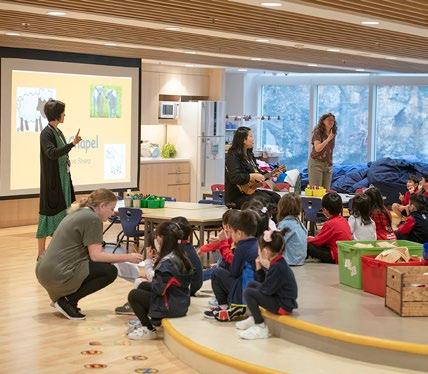
n We believe that teachers nourish themselves as professionals by continuing to learn at all stages of their career.
Therefore, we identify areas for our own personal and professional growth and implement plans to strengthen our curriculum and instruction. We find ways to learn from our colleagues and to share our knowledge with others.
The Religious Dimension of Our Program
HKIS is grounded in the Christian faith and is respectful of the spiritual lives of all. The Christian faith is a response to the redemptive grace and love found in Jesus Christ, and recognizes that each student is a precious child of God regardless of background, belief, and experience and respects that each is on their own journey. The overall Christian ethos at HKIS is intended as an ongoing open invitation into dialogue rather than an expectation of adherence to Christian belief. We welcome students from all religious backgrounds and experiences, Christian and non-Christian alike. We offer Christian experiences and encourage engagement in Christian practice but the ethos is primarily seen, heard, and shared day-by-day in an intrinsic manner with the intent of loving and honoring each student, no matter their beliefs. The formal aspect of Religious Education at HKIS, discussed in more detail on page 13, combines mind and heart in developing both an academic understanding of religions as well as encouraging a sense of one’s spiritual identity. In line with our Student Learning Results, we seek to increase students’ understanding and respect of Christianity and other faiths while also supporting students as they grow in appreciation of the spiritual dimension of themselves and others. It is our hope that students will find solid footing in this aspect and will be adept at sincere and caring dialogue with people of any culture and religious traditions, seeking to live in harmony with all.
Language Policy Across the Curriculum: English and Other Languages
HKIS’s primary focus is to provide a high quality education with English as the language of instruction. Our school promotes and celebrates a school climate that values and appreciates cultural and linguistic diversity. In the context of our school, every student, teacher and parent has many opportunities to build community through language. HKIS encourages everyone to be sensitive to how the use of different languages affects others. Our goal is for everyone to feel included and accepted. Therefore, in mixed-language groups outside the classroom, students are encouraged to use a language common to everyone in the group. Although our language of instruction is English, the occasional use of other languages in classroom settings may be appropriate if there is a need to clarify difficult concepts with someone from the same language background.
6 Hong Kong International School
HKIS Community Expectations and Communication Guidelines
Introduction
HKIS as a community is committed to building and sustaining a welcoming and secure learning environment in which individuals can fully realize their potential in a climate of mutual respect. HKIS believes that parents and educators share the responsibility for creating a partnership that fosters children’s learning. Together we play a formative role in the development of a child’s sense of justice, equity and the worth of all members of our school community.
It is our hope that these guidelines will provide a useful framework to promote effective and appropriate communication within the HKIS community, and will support the HKIS policy Promoting a Culture of Respect (Policy 3170, printed below and available on DragonNet.)
Working in Partnership
We recognize that effective partnerships are characterized by clearly defined responsibilities, a shared commitment to collaboration, open lines of communication, mutual respect and a common vision of the goals to be achieved.
The responsibility of the school (teachers, administrators and support staff) is to:
• Provide a safe environment that supports the development of positive learning attitudes, habits and values that are consistent with the mission of the school.
• Provide high quality curriculum and instruction in a supportive environment.
• Encourage students’ growth as responsible, independent and respectful individuals.
• Model integrity, academic curiosity, responsibility and creativity.
• Communicate and work with parents as partners in ensuring student achievement reflective of the HKIS Mission and Student Learning Results.
• Provide timely and clear information about school programs and events.
The teacher’s responsibility is to:
• Explain the curriculum and approach to learning in the classroom, expectations, methods of assessment and reporting of learning to students and their families.
• Report student progress regularly to parents (the frequency of communication is determined by each division).
• When appropriate, work with parents, counselors or learning specialists to provide a team approach to support for students.
• Communicate how parents can support what is going on in the classroom.
• Share observations, interests and concerns during emails, meetings and parentteacher and student conferences.
• Invite parent involvement in the learning process, for example, participating in class activities, attendance at school events, invitation for guest speakers or connecting with the wider HK community.
• Respect family needs and values.
• Invite input and feedback from parents.
• Respond in a timely fashion to emails or phone calls from parents.
The parent’s responsibility is to:
• Provide a home environment that supports the development of positive learning attitudes, habits and values that are consistent with those of the school.
• Play an active part in their child’s learning (monitoring attendance).
• Help their child capitalize upon successes and learn from setbacks and failures as part of his or her growth process.
• Review, with the child, information provided by the school that provides insight into student learning and growth, for example, assignment feedback, report cards, conference information, emails.
• Communicate with the teacher, as developmentally appropriate, if the child is having problems with learning.
Lower Primary Parent Handbook 7
• Inform the school of any family or home situation that may affect a child’s learning or behavior.
• Participate in the decisions about their child’s education.
• Be responsive to requests for input, feedback or opinion.
• Stay informed by reading the school newsletter, class updates or accessing the website.
• Attend, as family responsibilities allow, parents’ events or education evenings. These include: parent coffees, division parent forums, parent-to-parent meetings, curriculum nights and parent feedback.
• Participate, as family responsibilities allow, in school organizations such as PFO, PAG and Booster Club and events.
• Respect a teacher’s academic efforts by minimizing a child’s absence from school for non-critical reasons.
Expectations for Communication at HKIS
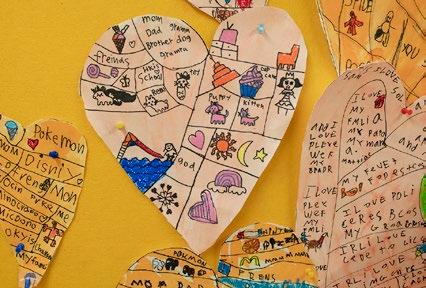
It is expected that all members of the HKIS adult community will abide by the following principles for verbal and non-verbal, written and oral communication at HKIS:
• All communications demonstrate the assumption of good intent and the goal to be constructive.
• The tone of all communications demonstrates care, respect for others and sensitivity for diversity.
• Email is the preferred form of contact, unless an issue is urgent or would be better addressed through face-to-face or phone contact.
• Reasonable time is allowed for responses to communications.
• Confidentiality is respected.
Sequence of Communication Channels for Parents
• Contact the teacher directly if you have questions or concerns about your child or the instructional program in your child’s class.
• Contact the principal or associate principal if the teacher’s response to your first contact does not sufficiently address your concern or if your concern is at the school level.
• Contact the Head of School if the Administrator’s response does not address your concern.
Addressing Disagreements
Dealing with disagreements requires respect and discretion by both the school and parents. Both parties should respectfully seek to gather accurate information and resolve problems through appropriate channels of communication. Each adult shares the responsibility to provide a collaborative decision-making model in the best interest of the child – be prepared to listen, contribute, negotiate and support decisions and operate from the assumption of good intent.
Confidentiality contributes to maintaining trust between parents, teachers and administrators. All adults should use discretion about when, where and with whom issues are discussed. It is important that all adults do not discuss individual children, teachers or families in inappropriate public and social situations.
Harassment (Policy 3170, available on DragonNet)
HKIS is committed to building and sustaining a culture of respect, care and safety that is free from any form of harassment, bullying and intimidation. All members of our community – students, parents, faculty, staff and visitors – have a right to feel safe and protected and share the responsibility to build and maintain an environment in which everyone feels respected. Offensive, harassing, bullying or intimidating behaviors will not be tolerated or ignored and will be dealt with appropriately and expeditiously.
8 Hong Kong International School
Across the school, both prevention and intervention strategies are in place for our student and adult community, and will be published and reviewed annually, to encourage empathy and respect and to respond appropriately to any acts of bullying and harassment.
Any repeated behavior that offends, upsets, embarrasses, frightens, excludes or hurts another person is bullying and/or harassment. HKIS recognizes that these behaviors can take many forms including:
Verbal Bullying and/or Harassment
• Language – name-calling, spreading rumors, and/or directing insulting, teasing, threatening comments to another person.
• Virtual – harassment or spreading rumors by email, instant messaging, blogs or any other media form.
• Religious – putting down or ridiculing another’s religion, stopping another from expressing their beliefs.
• Racial – making hurtful comments or discriminating against someone based on their nationality, race or culture, color of their skin or language spoken.
• Intellectual – making hurtful comments based on someone’s intellectual or academic ability.
• Sexual – making hurtful comments or discriminating against someone based on their gender or sexual orientation.
Non-Verbal Bullying and/or Harassment
• Physical – hitting, kicking, pushing, spitting or any other form of physical behavior which is deemed to be aggressive in nature.
• Personal property (real or virtual) – taking, damaging or trespassing another’s property. This includes entering another student’s email account, personal belongings, or school locker without permission.
• Indirect – intentionally excluding someone from a group, discussion or team.
• Graphic/vandalism – defacing another’s property, projects or photographs.
• Sexual – making offensive gestures about another’s body, touching or maintaining unwelcome closeness to another person or discriminating against someone based on their sexual orientation.
Each division will implement age and stage appropriate prevention strategies aimed at developing an ethos of caring and empathy to reduce the likelihood of bullying and harassment.
The school will respond to incidents of bullying and harassment promptly and with sensitivity toward both the victim and the perpetrator recognizing that often those who bully others have been prior victims of bullying and/or harassment.
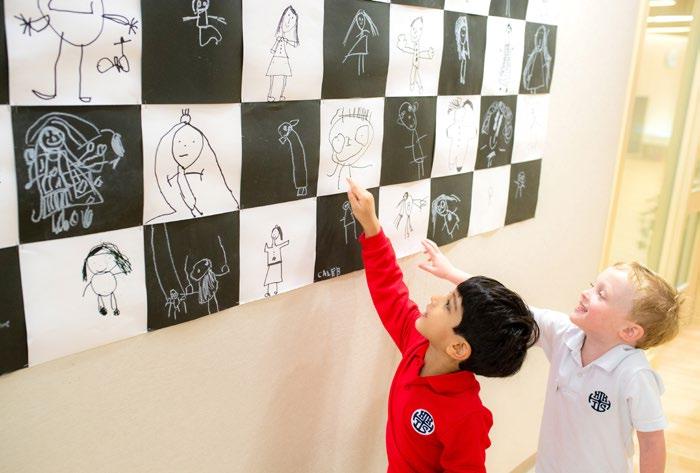
Lower Primary Parent Handbook 9
School specific interventions and consequences for incidents of bullying and/or harassment will be published in school handbooks and on the school website.
Communication Between Home and School
A child’s school life is greatly enriched by a family that is well-informed and active in school activities. We welcome your involvement and encourage close ties between parents and teachers. Below are examples of how we communicate with parents:
n The Monday Newsletter from the Principal
Every Monday the principal sends an email newsletter with information about weekly activities and events at school. The newsletter may also include news from community organizations such as the Parent Faculty Organization (PFO), Booster Club, Annual Fund Committee, and Church of All Nations. This newsletter is an important means of communication between school and home, so please take the time to read it. The newsletter is also available on the Lower Primary DragonNet webpage.
n Classroom Information
Individual classroom teachers communicate regularly with parents, through class blogs, newsletters and personal emails or notes. Our goal is to keep you informed about your child’s development.
n Orange Notices
Occasionally, we send home information notices that require parent signatures. We print these notices on orange paper to signal that it needs your immediate attention, and you must sign and return it to school. If your child is in Reception 1 or 2, please put these notices in your child’s clear plastic folder to return it to the teacher.
n Parent Coffees
We hold these events throughout the year and provide opportunities for parents to hear more about our educational program. This is also an excellent opportunity to meet other parents in an informal setting.
n Back-to-School Nights (Open House)
One night is set aside in the fall for Lower Primary Back-to-School Night. The evening is mostly spent with a presentation by your child’s teacher in the classroom, as well as an opportunity to meet all specialist teachers and learn about their program.
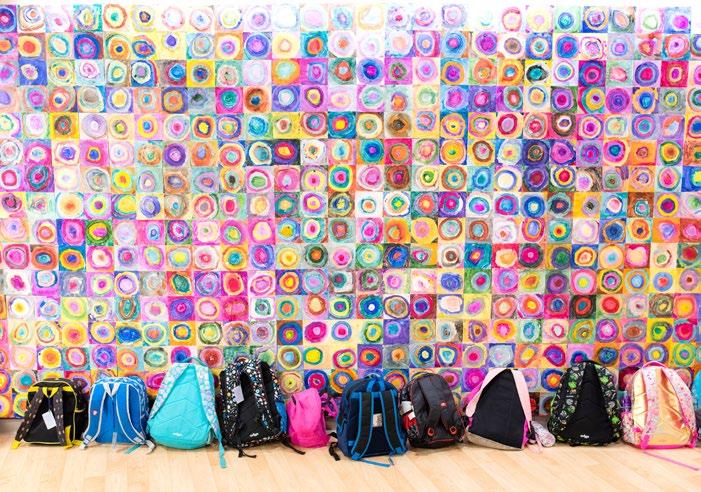
10 Hong Kong International School
Discussing HKIS on Social Media
Social media is a great way to share positive news and events about HKIS, as well as to communicate factual information about policies and school life with others in our community. In line with the HKIS Community Partnership and Communication Guidelines in school policies, all communications on such channels must assume good intent, be constructive, and communicate care, respect for others, and sensitivity for diversity.
We would also like to emphasize that specific student issues are best discussed privately with school representatives, not on group chats (e.g.: WhatsApp, We Chat, mass emails) or public platforms (e.g.: closed or public groups or pages on Facebook, Twitter). Neither should members of our community lobby for changes in policy or procedure on these platforms. Please refer to the Sequence of Communication Channels in the HKIS Community Partnership and Communication Guidelines for the appropriate procedures on how to address concerns at the school.
Posting photos and stories on social media accounts are a wonderful way to share life at HKIS with friends and family. For the safety and privacy of our students, please be reminded that photos taken on campus should not be shared on any public profiles or media outlets without the consent of the school. Please refer to HKIS Social Media Policy (Policy 3180, available on DragonNet) for more details.
HKIS Marketing Office: Stories & Snapshots
HKIS’s Marketing Office shares stories about HKIS with our community and the public. These are distributed through different channels, such as the News & Media page on the website, DragonBites stories and DragonTales Magazine on HKIS Pages, and the Dragonwaves podcast. Please also follow HKIS’s social media accounts on Facebook, Instagram, LinkedIn, and Twitter
Advertisements
Occasionally, our office receives requests from external organizations or companies to advertise various items to our parents. Please contact the LP Office or the Marketing Office to seek approval.
Problems and Concerns
Our school has established a protocol for whom to contact should a concern arise. This provides an opportunity for the people closest to the issue to resolve it together before involving a supervisor. At HKIS, our teachers are committed to working with parents to ensure children’s success.
When you have a concern about your child, please contact your child’s teacher first. Our teachers care about each child’s whole development and want to work in partnership with you to ensure that your child is successful in school. Parent conferences take place regularly to discuss your child’s progress in school, during the first and second semesters, for all grade levels. Report cards are sent home in December and June. See “Reporting on Student Learning” for more details. If you have further questions or are not satisfied with the response, please contact the respective supervising administrator.
If your concern is about a divisional matter, please contact Principal Geoff Heney.
If your concern is about a schoolwide matter, please contact Dr. Ron Roukema, Interim Head of School.
Lower Primary Parent Handbook 11
Learning and Growing in Early Childhood: The Educational Program
Organization of Grades in Lower Primary
Reception 1 is HKIS’ pre-kindergarten program for four-year-olds. We currently have 10 classes with a class size of 17. Reception 2 is our kindergarten program for fiveyear-olds. We have 10 classes with a class size of 20.
Grade 1 is typically for six-year-olds and Grade 2 is typically for seven-year-olds. We currently have 10 classes in each of these grades; both consist of 21 students per class.
How Do We Teach Academics in the Early Years? Literacy, Mathematics, Religious Education, Social Studies and Science, Educational Technology
In Lower Primary, we believe in children’s capacity and agency to construct meaning. Inquiry, through a language-rich environment, play and collaborative projects, is the most motivational and purposeful way for students to learn. Through a child-centered approach to teaching and learning, teachers design a developmentally appropriate curriculum where children’s interests are reflected. We believe in making learning visible by documenting and reflecting process, not product, thus assessing student learning authentically.
n Literacy (Listening, Speaking, Reading, and Writing)
The Lower Primary School uses curriculum that is founded on standards by the National Association for the Education of Young Children (NAEYC) and the Common Core State Standards. Reception 1 uses components identified by the Creative Curriculum for Preschool in conjunction with the NAEYC. Reception 2 through Grade 2 uses the Common Core State Standards and the Capacities of a Literate Individual as foundations to the curriculum.
Reception 1 Literacy Components:
• Building a reader and writer identity
• Speaking and listening
• Literacy as a source of enjoyment
• Vocabulary and language
• Phonological awareness
• Letters and words
• Comprehension
• Books and other texts
n Mathematics
Reception 2, Grade 1 and Grade 2
Literacy Standards:
• Building a reader and writer identity
• Speaking and listening
• Foundational skills (phonemic awareness, phonics, and fluency)
• Reading and writing narrative, opinion, and informational texts
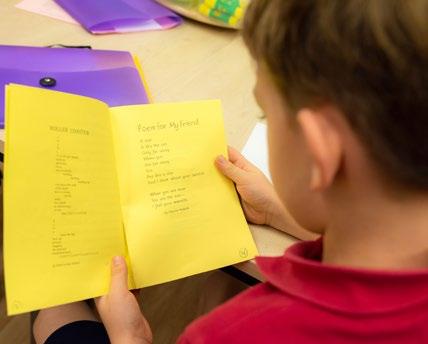
• Language (conventions, syntax, and vocabulary)
HKIS uses the Common Core State Standards for Mathematics and the Standards for Mathematical Practice to establish grade-level benchmarks. These standards provide a clear, organized, and developmentally appropriate set of math skills and concepts for students to cultivate throughout their academic journey. The standards are designed to build a coherent progression of learning from one grade to the next, with a focus on connecting new knowledge to previously learned foundations. The mathematics standards develop the knowledge and skills that students need to be prepared for mathematics in college, career, and life. The standards prioritize a greater focus on fewer topics, which helps students gain strong foundations, including a solid understanding of concepts, a high degree of skill and fluency, and the ability to apply the math they learn inside and outside of the classroom. The Standards for Mathematical Practice describe how students engage with the content standards. Both sets of standards work together to support our students in accessing the knowledge and skills they need to develop true understanding. In Lower Primary, our goal is to help our students become confident and successful mathematicians.
12 Hong Kong International School
The Standards for Mathematical Practice
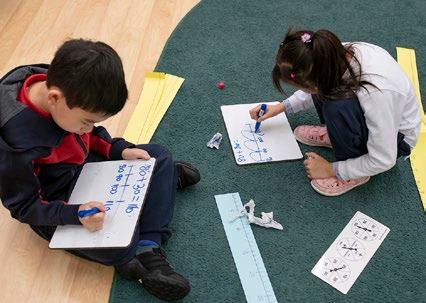
• Make sense of problems and persevere in solving them
• Reason abstractly and quantitatively
• Construct viable arguments and critique the reasoning of others
• Model with mathematics
• Use appropriate tools strategically
• Attend to precision
• Look for and make use of structure
• Look for and express regularity in repeated reasoning
n Religious Education
Domains for Mathematical Content
• Counting and Cardinality
• Operations and Algebraic Thinking
• Numbers and Operations in Base Ten
• Measurement and Data
• Geometry
At HKIS, Religious Education reflects the school mission and SLRs. As a school "grounded in the Christian faith and respecting the spiritual lives of all", we provide students an academic study of religion. Religion units in the Lower Primary explore a variety of topics and ideas. Each topic is explored from a Christian perspective. Students then explore how people of other faiths view that same topic, which helps them understand how others see the world. In LP we are focused on similarities of believers. We support our students in their individual spiritual journey.
HKIS has developed a unique set of standards to closely encompass our core beliefs. Our Religious Education program is developed around three standards. Each one is equally important. As students learn about Christianity and other world religions, the development of individual spirituality is the thread that ties everything together.
Standard 1:
Students recognize, define, and articulate their own spiritual identity, and demonstrate how it applies to their personal decisions.
Standard 2:
Students demonstrate an understanding of the Christian story and the centrality of Jesus in the Bible.
Standard 3:
Students understand both the common and unique beliefs, practices, and influence of the major religions of the world
Grade levels hold chapels focused on the Christian message as well as assemblies focused on many themes including special visitors and cultural festivals. Divisional chapels and assemblies take place once a month.
n Social Studies and Science
Science and social studies are taught using an inquiry-based approach. Scientific processes including observation, collecting, recording and interpreting data, predicting, classifying and drawing conclusions are practiced in hands-on, meaningful activities. Students learn concepts, as well as information. In addition, skills of reasoning, problem solving, working collaboratively, goal setting and decision making are practiced throughout the curriculum.
n Educational Technology
We believe that children learn best when they are actively involved in constructing their own knowledge. This is learning by doing. The educational technologists and the teacher librarian work closely with teachers and children to facilitate and support constructivism, develop information literacy skills, to make learning visible, reflect on learning and to share their learning. Students use a range of developmentally
Lower Primary Parent Handbook 13
appropriate technology devices and software to support and extend their learning within the classroom program.
Our design and maker space, The Wonder Lab, is created specifically for early elementary students to explore, discover and cultivate their curiosity. It is the hub for STEM-related activities and technology projects, inspired by the Reggio Emilia approach to learning.
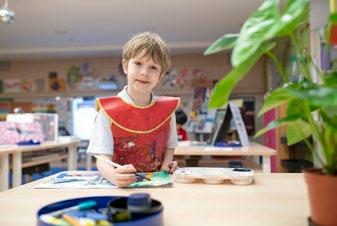
Specialist Classes: Art, Chinese Studies, Music, Physical Education
n Art
At Lower Primary, our art program is integrated with the classroom curriculum. This offers students a chance to deepen their learning in science, social studies and language. We believe that the physical making of images and artifacts allows students to make concrete their observations and responses to a complex world and to articulate their learning.
The students work from memory, observation and imagination in the creation of both 2D and 3D media. They use a wide range of materials and process and will experience drawing, painting, printmaking, sculpture, ceramics and mixed media in the making of both individual and collaborative pieces. These artworks are displayed in our school and provide valuable learning experiences. Through this process students will come to know both the world and themselves at a deeper level.
n Chinese Studies Program Philosophy:
“Language and communication are at the heart of the human experience.” As members of an international school and community, we endorse this statement by the American Council on Teaching of Foreign Languages (ACTFL). The learning of languages encourages students to respect and to understand other cultures, and heightens the awareness of one’s own culture. It also enhances divergent thinking and self-motivated learning. Language-learning equips students to participate more actively in the global community and to be more adaptable in an increasingly interconnected world.
Literacy is built upon a foundation of spoken language competence; therefore we believe that oral communicative language should rest at the heart of language instruction. Reading is gradually introduced followed by writing.
The central goal of language-learning is the communication and exchange of ideas, perceptions and needs. These skills will enable learners to meet social and informational needs in the Chinese-speaking world.
The HKIS Chinese Studies program fully embraces the differentiated needs of our learners. Since the acquisition of an additional language depends on a variety of factors, HKIS's language program delivers reading/writing and listening/speaking lessons that are based on the needs of the learner.
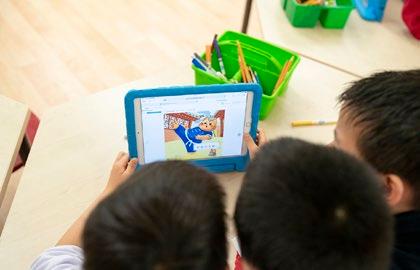
General Information:
All Lower Primary students participate in Chinese language instruction as part of their daily program. Class activities are varied and include games, songs, rhymes, dance, arts/crafts, stories and oral dialogues all designed to immerse students in Mandarin. We encourage parents to actively participate and support their students’ learning Mandarin by taking interest in the activities and projects.
Beginning in R2, the instruction of Chinese is divided into two distinct streams.
14 Hong Kong International School
Oral Communication
• No streaming, mixed grouping
• Follow basic classroom instructions
• Use visual and verbal cues (e.g., gestures, facial expressions pictures, tone of voice) to understand what they hear
• Respond briefly to simple spoken language
Mandarin as Second Language (MSL)
The MSL stream is designed for students with little personal experience or family exposure in Mandarin. The end goal of this stream is communicative functionality in Mandarin to exchange common, everyday thoughts, ideas, and information.
Oral proficiency work will be the emphasis in this learning stream. Students in this learning stream use the simplified characters system. The exit benchmark for this learning stream is based on benchmarks mapped out in the Chinese Studies R1-12 curriculum.
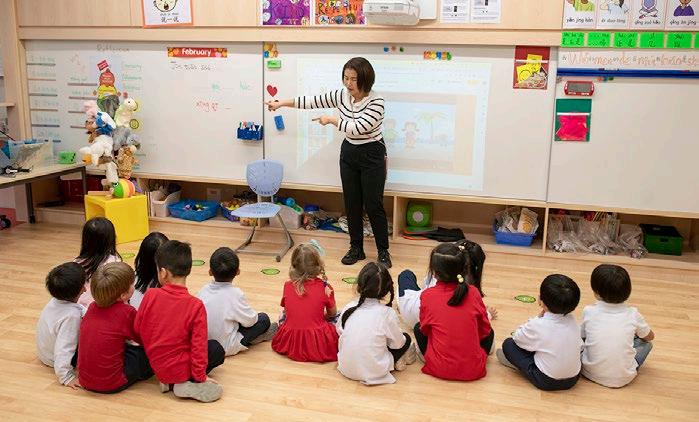
• Follow basic classroom instructions
• Use visual and verbal cues (e.g., gestures, facial expressions, pictures, tone of voice) to understand what they hear
• Respond to simple questions using single words and gestures.
• Sing songs, chants
• Follow basic classroom instructions
• Use visual and verbal cues to understand and convey the meaning of familiar material
• Respond to spoken language, using single words and phrases
• Recognize familiar words and phrases in familiar contexts
• Give simple presentations on familiar topics
• Ask some simple formulaic questions
• Follow and give basic classroom instructions
• Use visual and verbal cues to understand and convey the meaning of familiar material
• Respond to spoken language, using words, phrases or simple sentences
• Recognize familiar words and phrases in familiar contexts
• Give presentations on familiar topics
• Ask some topic-related questions
• Communicate about familiar topics, using words and simple phrases
Writing
• No writing
• No writing
• Copy a few basic characters
• Use drawing and letters to convey meaning
• Copy some simple and familiar characters
• Use drawing, letters and characters to convey meaning
Reading & Viewing
• Follow picture books with teacher
• Follow picture books with teacher
• Follow picture books with teacher
• Develop an awareness of characters
• Identify a few memorized words in familiar contexts
• Follow picture books with teacher
• Develop an awareness of characters
• Identify a few memorized words and phrases in familiar contexts
R1
R2 G1 G2
Lower Primary Parent Handbook 15
Oral Communication
Mandarin for Near-Native Speakers (MNN)
This learning stream is for students with personal experience and family exposure in Mandarin. These students have regular access to familial support in the areas of listening input, reading, writing, and speaking (e.g. parents are functional in Mandarin). These students are also proficient enough to use Mandarin as a medium to learn other content areas. The exit benchmark for this learning stream is based on benchmarks mapped out in the Chinese Studies R-12 curriculum.
R1 R2 G1 G2
• No streaming, mixed grouping
• Follow basic classroom instructions
• Use visual and verbal cues (e.g., gestures, facial expressions, tone of voice) to understand what they hear
• Respond briefly to simple spoken language
• Confirm understanding of a text read aloud or information presented orally or through other media by answering questions about key details
• With prompting and support, talk about/list familiar people, places, things, and events
• With prompting and support, speak audibly
• Confirm understanding of a text read aloud or information presented orally or through other media by asking and answering questions about key details
• With prompting and support, describe familiar people, places, things, and events
• Speak audibly and express thoughts, feelings, and ideas
• Ask and answer questions in order to seek help, get information, or clarify something
• Confirm understanding of a text read aloud or information presented orally or through other media by asking and answering questions about key details and requesting clarification if something is not understood
• Describe familiar people, places, things, and events and, with prompting and support, provide additional detail
• Speak audibly and express thoughts, feelings, and ideas clearly
• Ask and answer questions in order to seek help, get information, or clarify something
• Continue a conversation through multiple exchanges
Writing
• No writing
• Draws and writes to convey meaning
• Use a combination of drawing and some characters to convey meaning
• Use sentences to plan and present ideas in a logical order
Reading & Viewing
• Follow picture books with teacher
• With prompting and support, answer questions about key details in a text
• Read topic related texts with purpose and understanding
• Read some characters of learned vocabulary
• With prompting and support, ask and answer questions about key details in a text
• With prompting and support, retell familiar texts, including key details
• Read topic related texts with purpose and understanding
• Read some phrases and sentences in context with support
• With prompting and support, ask and answer questions about key details and unknown words in a text
• With prompting and support, retell familiar texts, including key details
• With prompting and support, identify major events, ideas, or pieces of information in a text
• Read topic related texts with purpose and understanding
• Read some sentences in context with support
16 Hong Kong International School
n Music
The Lower Primary Music program offers children an engaging curriculum that balances singing, instrument playing, conceptual learning, listening and movement. Each class has active opportunities for children to sing, play instruments, listen to music and move their bodies.
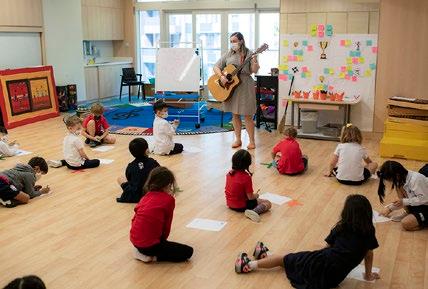
Our music students enjoying playing games and working cooperatively to build a feeling of community. Students often engage in musical inquiry, discovering how to write musical patterns and play them on instruments. Students also build their musical creativity by exploring instrument sounds or working on creative composition and improvisation projects in small groups.
The music program also offers a gentle approach to music literacy and theory called sound to symbol. Students develop their listening and noticing skills, then connect what they hear to notes they read and write. Students internalize music and use natural symbols such as dots and lines to show rhythm and melody. This is an intuitive first step to reading and writing music that forms a bridge to conventional notation in the future.
Performance is a very important part of the Lower Primary Music program, giving students opportunities to build work ethic, confidence and self-expression. At chapels and grade level concerts, students are given the opportunity to perform onstage or be part of an appreciative audience.
n Physical Education
The Lower Primary Physical Education program emphasizes physical literacy and the goal of being active for life through our five content areas.
Body Control: Students will develop the knowledge and skills necessary to control their bodies through rhythmic movements, gymnastics, dance, climbing and various games.
Object Control: Students will develop the knowledge and skills necessary to control a variety objects using a range of different skills.
Problem Solving: Students will discover how to solve problems on their own and with others through various physical challenges that promote resiliency, creativity and collaboration.
Sportsmanship: Students will learn the importance of and practice personal and social skills through a variety of games and activities that promote sharing, playing fair, helping each other and communicating with one another.
Fitness: Students will understand the importance of physical fitness and develop fitness levels through games, challenges and exercises that promote cardiovascular endurance, strength and flexibility.
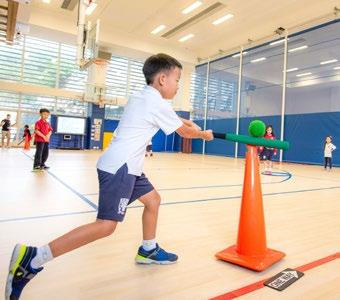
PE Swimming Information
Swimming lessons are part of the HKIS Physical Education program. All Lower Primary students will take part in a Learn To Swim program during scheduled swimming lessons at some point of the school year, at the Primary School pool.
HKIS Repulse Bay Aquatics Center
The indoor, heated, 25 meter state-of-the-art pool has been built as part of the Lower Primary campus to offer Primary students opportunities to swim and learn how to be safe in, on and around the water. The depth and water temperature of the pool are adjusted for the needs of young learners.
Learn To Swim Program
The HKIS Primary Schools Aquatics Program uses the Learn To Swim program based on swimming levels.
The objectives of Learn-to-Swim courses are to teach children to be safe in, on and around the water and to swim well. Aquatic and personal water safety skills are taught in a logical progression through six levels. Participants in Level 1 are oriented
Lower Primary Parent Handbook 17
to the aquatic environment and gain basic skills in each category. As they progress through the levels, participants build on their basic skills to learn and refine various propulsive movements on the front and back. Upon successful completion of Level 3, participants have achieved basic water competency in a pool environment. By the end of Level 6, participants have developed the necessary skills and fitness levels for entrance into advanced courses, such as competitive swimming, synchronized swimming, water polo or other aquatic activities.
Students of R1 will be participating in the Preschool Learn To Swim program, also based on swimming levels. The purpose of the Preschool program is to facilitate developmentally appropriate learning of fundamental water safety and aquatic skills. Information about the programs, levels and expectations for each are available on the HKIS Aquatics webpage
All students are assessed and receive a swimming level according to our Learn To Swim program.
Swimming Gear Expectations
All students are required to bring swimming gear on the days of swimming lessons. Swimming gear includes:
• Swimsuit
• HKIS swimming caps – a must for all swimmers. Swim caps can be bought at the Dragon Shop. Your child’s name must be written clearly on the front of the cap. Knowing the names of students will significantly improve communication between instructors and swimmers and, as a result, the learning experience and outcome.
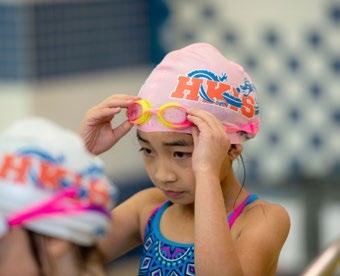
• Goggles
• Towel
• Flip-flops / Crocs (optional)
All items including swim bag must be labeled and include the child’s full name and homeroom.
Changing Before and After Swimming Lessons
All students change in the pool changing rooms. Shower cabins, toilets, lockers and hair dryers are available.
“No Swim” Policy
If a student is well enough to attend school, then they are expected to take part in curricular swimming lessons. In the event your child is unable to swim due to a medical condition, a note by a qualified physician must be provided.
An email including the medical note must be received by both the classroom teacher and the Aquatics Department at aquatics@hkis.edu.hk by the start of the school day. The email must include the student’s full name, grade, homeroom and a copy of the medical note attached. If communication has not been received prior to the start of the school day, it will be assumed your child is fit to swim and will be expected to do so, and without modification.
If a student is recovering from injury, notify the Aquatics Department by email at aquatics@hkis.edu.hk by the start of the school day. In this case, swim lessons can be modified to enable partial participation. It is not necessary to notify the homeroom teacher in such cases.
If a student misses too many swim lessons during a curricular swimming unit, the Aquatics Department may decide to not issue an Achievement Booklet reporting student performance and his/her completed swim level.
Assessing Student Learning
(Classroom Based Assessments, Developmental Continuum, Standardized Tests)
The assessment system in Lower Primary includes multiple assessment tools such as developmental continuums in reading and writing, foundational skills checklists,
18 Hong Kong International School
reading running records, collecting data on the various types of reading strategies children use as they read, math assessment profiles and student portfolios.
We believe assessments provide teachers with timely information for increasing individual student performance on a day-to-day basis. We believe that the most informative and accurate measure of student achievement is derived from classroom performance assessments based on daily observations of what students can do with what they have learned. Ultimately, we want students to understand how they learn, how they can evaluate their own performance and how they can undertake the learning necessary to improve their work. We want to help students learn how to interpret and celebrate their own growth. We believe all assessment should help our instructional planning, our communication with parents and the evaluation of the effectiveness of our program, materials and approaches. More information can be found in our Philosophy of Assessment.
Reporting on Student Learning
We believe that it is crucial to report about your child's growth and development at regular intervals. As such, we have a schedule of conference times and written reporting systems throughout the year.
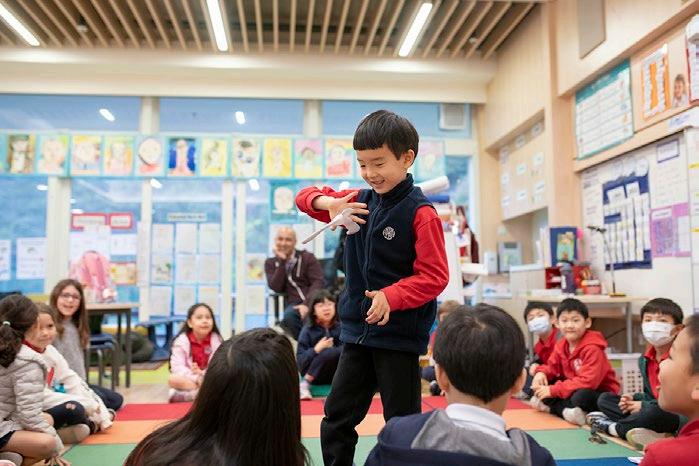
R1 through Grade 2 students receive report cards in December and June at the end of each semester.
Conferences occur three times per year. At the beginning of the school year, we have a "Hopes and Fears" conference between parent and teachers during orientation. This is a time that parents get to share their perspectives, including their hopes and goals as well as their fears on their child's learning and development with their child's teacher. A parent conference is organized in November during the first semester to discuss your child's progress. The second semester conferences are student-led, activity-based conferences. This is a time that a child accompanies a parent to the conference and models or shows his or her learning to their parents. Activities are planned to showcase the process of learning in a variety of areas. A short time to meet with teachers is also included, usually focused on a child's portfolio and goals. Signing-up instructions are issued via the Monday Newsletter. Parents must book their conference times online.
Lower Primary Parent Handbook 19
Student Services Team (SST)
SST Objectives
• Monitor student progress (academically, socially, emotionally) to allow for maximum classroom participation.
• Provide learning opportunities where students can achieve success.
• Link student need with appropriate support.
• Increase student self-awareness of individual learning strengths and challenges as well as skills of self-advocacy.
• Serve as a resource to provide strategies, information, and supplementary materials to students, parents staff, faculty, and administrators.
• Facilitate transition for students with learning differences from Lower to Upper Primary.
Social-Emotional Learning (SEL) and Counseling Program
The Lower Primary School Counseling program is purposely built to meet the needs of students during early childhood. A dedicated school counselor at each grade level creates opportunities to offer preventative support as well as responsive services to every student in the Lower Primary. Our school counselors build and maintain relationships with students and their families throughout their journey in Lower Primary, which ensures a continuity of care throughout these foundational years.
Our school counselors deliver regular SEL lessons to promote the social, emotional and academic development of our students. The SEL curriculum include topics such as:
• Skills for learning
• Empathy
• Feelings and emotional management
• Problem solving
• Child Protection (safe touch and refusal skills)
• Growth mindset
The LP School Counseling program provides responsive services through individual and group counseling, to support students in topics such as friendship, social skills, self-regulation, confidence, grief, growth mindset, etc. Furthermore, our school counselors facilitate transition groups and support for new and departing students and families.
Our school counselors work collaboratively as integral members of the Student Support Team and work in partnership with teachers, parents, school administrators and outside service providers to best support students. Our school counselors offer parenting classes and workshops throughout the school year and are available for consultation.
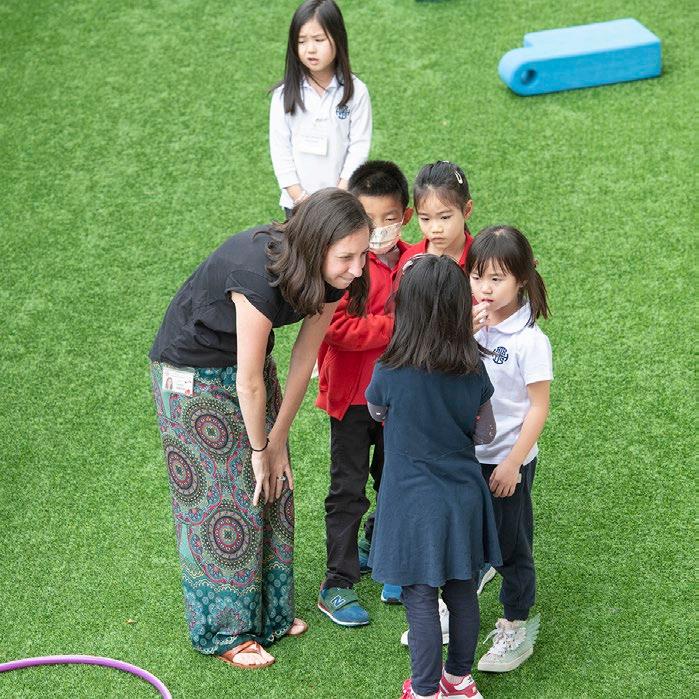
20 Hong Kong International School
Library
The Lower Primary Library welcomes all members of the HKIS community. The library is open Monday-Friday from 7:30 a.m. - 3:30 p.m. for borrowing by students, parents, and faculty members. It has a flexible schedule for students to visit the library whenever they would like to check out more books. In addition to being open daily, the library is also open for Family Library Saturdays several times throughout the school year. Students are encouraged to visit the library as often as needed for reading materials and assistance with book selection, information, and technology needs. Additionally, we will provide structured lessons for all grade levels that will introduce them to the fun and functions of our library, connect with curricular goals, and grow their love of reading.
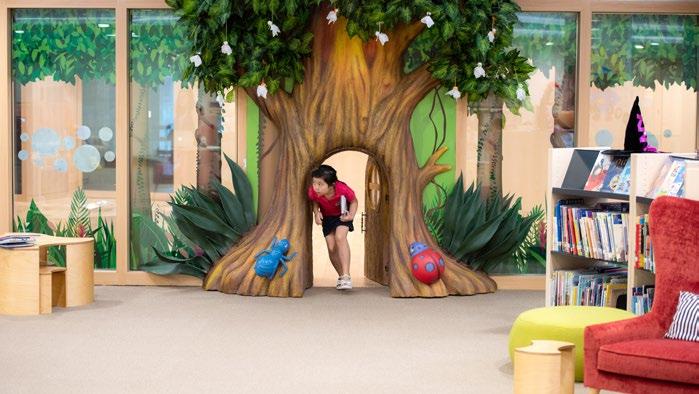
Our teacher librarian, and two library assistants are available to help students and parents with all of their information needs. The library has a large collection of print and electronic resources in both English and Chinese. Online resources, including an online catalog, a digital lending library, and online subscriptions can be accessed via DragonNet. Both our print and digital collections are continually changing, in order to provide students with the most current books in production to match their academic needs and personal interests. We encourage our community to visit the library often to help families create a culture of reading in their homes.
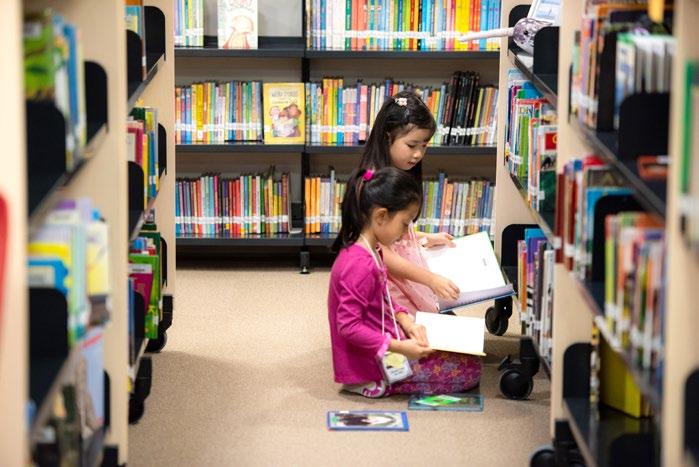
Lower Primary Parent Handbook 21
After School Activities (ASA)
Contact Details
HKIS Activities Office located in Repulse Bay (Lower Primary)
Email: activities@hkis.edu.hk
Telephone: 2812 5620 or 2812 5621
Website: https://www.hkis.edu.hk/ activities-arts-athletics/activities
The HKIS Activities Office promotes a range of activities for Lower Primary students, Monday to Friday after school, and during weekends in Repulse Bay and Tai Tam.
The programs provide students with the opportunity to develop fundamental skills through participation, as well as offering a pathway from grassroots to excellence. Students can engage in activities at a recreational level or move through the program pathways to more competitive opportunities. By learning the fundamentals and developing a positive attitude through participation, students can have fun, learn and develop life skills in a supportive environment.

Registration for activities is conducted directly with the program providers. Lower Primary families interested in learning more about the programs can visit the ‘Extra Curricular Activities’ page located under the ‘Activities, Art & Athletics’ section on the HKIS website. Here you will find contact information, registration forms, program outlines and schedules.
While some activities are available at 4 p.m., they are for those who are able to return to school at that time. Students are not permitted to wait for activities to begin.
If you require further information, please contact the Activities Office directly.
22 Hong Kong International School
School Policies and Procedures Enrollment
Grade Placement
Grade level placement is based on the cut-off date of August 31. Since we are an international school and enroll children from various educational systems, we have found it most successful to place children with peers of similar age. Each class has a wide range of academic abilities and skill levels, and our teachers are experienced in supporting and challenging all children to reach their fullest potential throughout the school year.
Withdrawals
If transferring to another school, a written notice should be given to the Office of Admissions as soon as the withdrawal is confirmed. School records that need to be sent to another school will be provided by respective divisions upon request. Families leaving HKIS will receive an exit survey via email to complete the withdrawal process. Any questions concerning re-enrollment or withdrawal should be addressed to the Office of Admissions.
Changes in address or telephone number should be updated online at https://hkis.powerschool.com/public, and communicated to the child's teacher as soon as possible.
Orientation and Hopes and Fears
At the very beginning of the school year, parents and children have an opportunity to meet the teachers and receive a brief orientation to the grade level program before school actually begins. Parents may use this time, called Hopes and Fears, to provide information about the child’s learning styles and preferences and any other information that may help the child’s adjustment. The specific time for your orientation/Hopes and Fears meeting will be sent to you before school starts.
Student Life Birthdays
Student birthdays are celebrated with the community. Parents are welcomed to send a simple treat to school to make it special but not to join in the classroom for the celebration with their child. Please do not send in party or loot bags for the class. Treats which are healthy are desirable. Communicate with your child's teacher for specifics. Should party bags get sent in, we will return them back home.
We invite children on their birthdays to make a lasting contribution to our library by purchasing a book containing a specially designed nameplate with their name and birthday. Check with our librarian for more details.
Please check with your child's teacher about ways to plan for birthday celebrations in the classroom.
Cafeteria, Snacks and Lunches
Our school has a wonderful cafeteria, which offers healthy and balanced lunch options for our children. Our parents, teachers and Sodexo personnel have worked collaboratively in planning for an eating experience that supports understanding of healthy food, eating well balanced meals and enjoying eating with friends and classmates. Purchasing lunch is an option we are excited to offer our students.
Parents may purchase lunches online and may also view the monthly menus. The cafeteria will serve two options daily, or students may also opt in to only purchasing a snack option, which will be served family style on a daily basis at the tables. These snacks will be vegetables and fruits, some organic. The vegetable and fruit options are a way for children to share and experience eating family style, with a focus on the pleasure of sharing in a meal.
Parents who prefer to send healthy lunches from home are welcome to do so. Please be reminded that Lower Primary adheres to a total Nut-Aware/Nut-Free Policy throughout the entire campus.
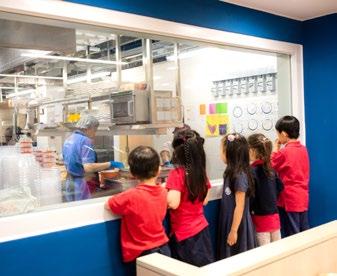
Lower Primary Parent Handbook 23
Field Trips
Field trips are an important part of our school curriculum. They provide extended, hands-on learning experiences for all the children. You will be informed of all field trips in advance. We use our own regular school bus for transportation. Parents are welcome on field trips. Siblings are not permitted to attend field trips as this takes away from the safety and supervision of our students and it is a special time for our learners. Teachers will inform parents about field trip attendance and volunteer parent chaperones. Please note, domestic helpers and/or nannies are not permitted to accompany children on field trips.
Home Learning in Lower Primary
Students at HKIS spend their school days engaged in rich, structured and developmentally purposeful learning. We believe in nurturing a child’s imagination, social-emotional skills, physical growth, creativity and intellectual curiosity--fostering their achievement and success both at school and at home.
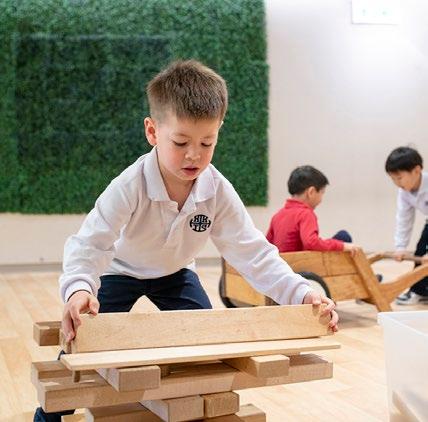
We do not give specific homework assignments in Lower Primary. Instead, we hope that students engage in activities at home and in the community that support their learning in school. Making time for reading, unstructured play and everyday adventures helps children consolidate the structured learning of the school day and gives them a solid foundation for continued academic growth.
n What does the research tell us?
An ever-growing body of knowledge and research of early childhood development and learning influences our work with young students.
• Research from top educational institutions such as Duke University and the Harvard Family Research Project shows that homework is not effective in increasing academic achievement for young children.
• Reading for pleasure and reading consistently is positively connected to achievement. Experts recommend giving children opportunities to choose their own books, read independently, read with their families, have others read to them, and talk about the books they read. Engaging in meaningful conversations about books is an essential element of developing students’ foundation and identity. Building sustained time for reading is important and must be modeled and supported.
• Authentic life experiences provide moments to nurture curiosity and develop capacities for mathematical thinking. Everyday activities such as shopping and taxi rides teach children that math is all around us, and will build deeper mathematical concepts and language.
• Children need time for unstructured play to grow their imagination and creativity. They also need time to play with their families and friends, cultivating their socialemotional lives and their physical development.
• The brain develops in childhood through multiple experiences that require handson, constructivist and child-centered experiences. Play is the best form of learning when children are young.
n Our Partnership
Teachers and staff will connect with families to ensure parents have practical, timely information on your child’s learning and development. At Back-to-School Night, as well as throughout the school year, parents will receive ideas for activities and experiences that foster children’s growth. We believe there are many ways for families to explore these opportunities, and the diversity of your experiences enriches our entire school community. Our primary math resource is Bridges from the Math Learning Center, which has a variety of math activities for parents and students to engage in at home. At times throughout the year, teachers may provide enriching activities from Bridges Math Connections for families to enjoy together. We believe that engaging experiences are the most supportive form of learning for young children.
24 Hong Kong International School
There may be times that students need specific practice at building skills or development, and in those instances, teachers will work closely with parents to provide the information needed to support this growth.
Some students may receive home learning activities to support their Mandarin language development, when appropriate. In all cases, parents are welcome to explore the resources available through our LP Library and our faculty for inspiration and activities. Teachers and staff strive to support families and work together as partners in a child’s learning journey.
School Supplies and Backpacks
The school provides classroom materials and supplies, so children do not need to bring extra materials. Children should bring an appropriate sized school bag or backpack to carry home daily papers, notes, library books, lunches, a water bottle and personal belongings. Parents should teach their children how to open zippers and carry their backpack safely. Parents should also take care not to select oversized bags or those with complex openings or zippers. Backpacks with large openings and easy zippers are ideal for this age group. Many supplies can be purchased from the Dragon Shop. Do not send in phones or any electronic devices including smart watches. Toys may only be brought in for special occasions such as show and tell.
Six-Day Schedule
Our specialist schedule follows a 6-day cycle. This means that your child receives instruction in music, art, PE and Chinese following a 6-day cycle. A copy of this year’s cycle can be found on on the inside cover of this handbook. Details of your child’s class schedule will be given at Back-to-School Night.
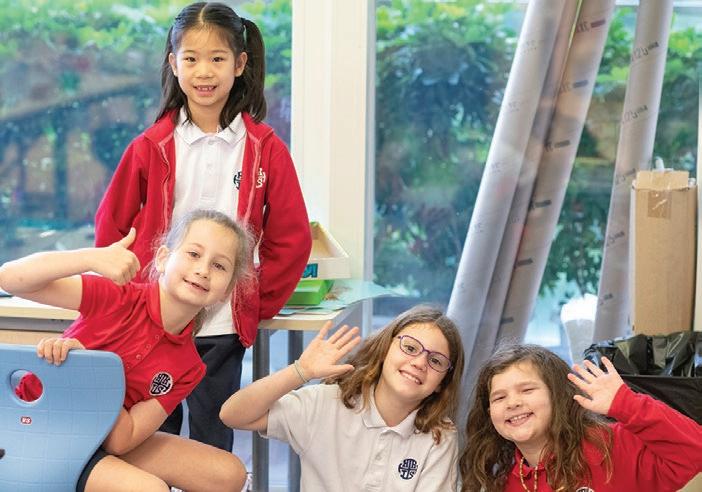
Tutoring
Some parents may choose to employ a tutor for their children. This is highly discouraged at this age. If you believe your child needs tutoring, please discuss this with your classroom teacher, counselor and/or LP administrator. Parents need to be aware that teachers are not allowed to tutor any child who is currently in a class they are teaching or could potentially be teaching, as this presents a conflict of interest.
Lower Primary Parent Handbook 25
Uniform n Dress Code Policy
The Lower Primary official dress code colors are navy blue, red and white. It is the responsibility of parents to ensure their children are dressed according to the policy below. The dress code reflects the mission and vision of the school and unifies our student community as representatives of HKIS. All uniforms are available for purchase from the Dragon Shop located at the High School Campus in Tai Tam.
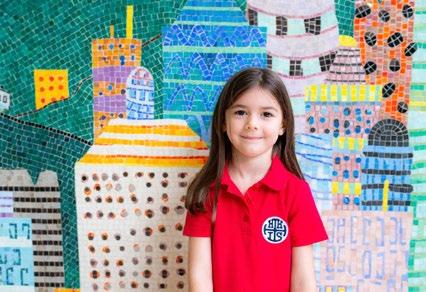
Please refer to Lower Primary Dress Code & Uniform Guide for details.
DRAGON SHOP:
HKIS High School, Level 2 (near cafeteria), Monday – Friday (9 a.m. – 2:30 p.m.)
Tel: 3149-7186, dragonshop@hkis.edu.hk
TOPS
COLOR HKIS red or white – solid color Available for purchase in Dragon Shop (no stripes or other colors)
STYLE Long or short sleeve polo shirts with collar and 2-3 buttons
PERMITTED: Special Edition PFO Chinese New Year top –any year
LOGO HKIS logo, upper left – on body Polo available for purchase at Dragon Shop
NOT ALLOWED: Tears, holes, ragged edges, stripes, sports team logos, other logos bigger than 1x1 inch
BOTTOMS
COLOR Solid navy blue or denim jeans Available for purchase in Dragon Shop (No stripes or other colors)
STYLE Shorts, skirts, skorts, leggings, sweatpants & trousers
LOGO Not required
Shorts length: 5” inseam or longer
Skirt length: must extend beyond the fingertips
NOT ALLOWED: Tears, holes, ragged edges, cut off shorts or pants, stripes, other logos bigger than 1x1 inch
COLD WEATHER UNIFORM LAYERS
COLOR Red, white or navy blue Must be purchased in Dragon Shop
STYLE Sweatshirt, cardigan, fleece jacket or fleece vest
PERMITTED: Special Edition PFO Chinese New Year top –any year
NOT ALLOWED: Tears, holes, ragged edges, stripes, sports team logos, other logos bigger than 1x1 inch
PLEASE NOTE: During colder weather – any type of personal warm weather jacket is permitted. Uniform top must be worn underneath.
OTHER
SHOES STYLE: Closed toe COLOR: Any
NOT PERMITTED: Clogs, shoes with wheels, or flip flops
SOCKS/TIGHTS Solid red, white or navy blue
HATS Any style or color – optional
PHYSICAL EDUCATION + SWIMMING
PE Athletic shoes are recommended (slip-on shoes are not permitted)
SWIM One piece swim suit, towel, goggles, flip flops/crocs/beach shoes, HKIS swim cap (available to purchase from Dragon Shop)
26 Hong Kong International School
Accessing the School
Busing
n Bus Supervisors
All buses have been assigned a bus supervisor whose role is to assist in providing safe transportation of students to and from HKIS. They assist children boarding and departing the bus and in maintaining appropriate student behavior in accordance with bus rules. They provide a written record of violation of student bus rules to the bus coordinator, who liaises with the school administration team. To assist the bus supervisors in performing their role, they participate in training sessions each year. The training consists of reviewing the bus company's policies and procedures as well as learning effective strategies for maintaining appropriate behavior on the bus.
n Changing Buses
Students in Grade 1 and Grade 2 may change buses by providing written notice two school days before the day of the change. Please log onto https://webapp5.hkis.edu.hk/aas/index.php/welcome/parent (also available through PowerSchool) to register your bus change request.
Please remember, if you are trying to make a change for Wednesday, an email must be received by Monday at 5 p.m. This will allow enough time for the bus coordinator to confirm adequate space on the bus. Please note the following rules for all students:
• Changes are only made if there is space available and are not guaranteed.
• No changes will be made on the last day before holiday in Christmas, Chinese New Year, Easter or on a half day.
• Notice given within two school days will not be accepted. For a monday change, the email must be received by thursday at 5 p.m.
Reception 1 and Reception 2 students will not be permitted to change buses. This is to support the developmental needs of the youngest children, given that they may find it challenging to articulate changes or to know where they are supposed to be going on a given day.
n Enforcement of Bus Rules
1. The bus supervisor is responsible for upholding discipline and seeing that bus rules are followed.
2. Students not following appropriate bus behaviors will be given a warning by the bus mother.
3. Continued student misbehavior will be reported to the bus coordinator and division administration for further disciplinary action.
n Mandatory Busing Policy
HKIS requires all Lower Primary students to ride the bus to and from school. Students will use their HKIS ID card to access the school buses. For details, please visit the school website: https://www.hkis.edu.hk/community/bus-information/ mandatory-bus-policy
Parents must agree to the terms when they update their family information at the beginning of the school year on the PowerSchool portal. By signing off on PowerSchool, the school will hold all family members accountable to HKIS policies regarding busing and private vehicle access to the campuses. If parents do not abide by mandatory busing rules, their child's enrollment could be jeopardized at HKIS.
n Safety Rules for All Bus Riders
• Students are to board their buses immediately after school and remain on board.
• Students must remain seated at all times.
• Arms, legs, hands, etc. must remain well inside the bus at all times.
Lower Primary Parent Handbook 27
• No objects of any kind are allowed to be thrown on the bus or out the windows.
• Students are to be courteous to drivers, bus supervisor and fellow students.
• No food or drinks are allowed on the bus.
• When getting off the bus, students are to remain seated until the bus comes to a complete stop.
• Fighting is not permitted.
• Obscene language is not permitted.
• When getting off the bus, students are to wait for the bus to leave before crossing the street to allow a full view of oncoming traffic.
• No interfering with the bus driver, bus equipment or the bus supervisor.
• Parents (of students in R1 to G2) are to meet small children at the bus stop in the afternoon and bring them to the bus stop in the morning, or make suitable arrangements.
• Adults are allowed to ride the bus only if this does not prevent a child from having a seat and will pay a fee of $50. Children are not allowed to sit on laps or on the floor.
n Transportation to School
Kwoon Chung Motors Company Limited has been providing bus services for HKIS students, to and from school, on a contract basis for over 40 years. Registering and paying for transportation to and from HKIS is the responsibility of parents. HKIS, while assisting parents in obtaining transportation on school buses, does not carry responsibility or any liability incurred through the bus transportation.
General information regarding registration, fares, and routes can be found online at http://school.kcm.com.hk/hkis/. Questions regarding fares and routes should be directed to Kwoon Chung Motors at 2978-8798 or faxed to 2806-8132.
Our bus coordinator for Lower Primary students, Mr. Kenny Chu, acts as an intermediary between parents and the bus company.
HKIS agrees to allow Lower Primary students to walk to campus if they live within any of the following areas:
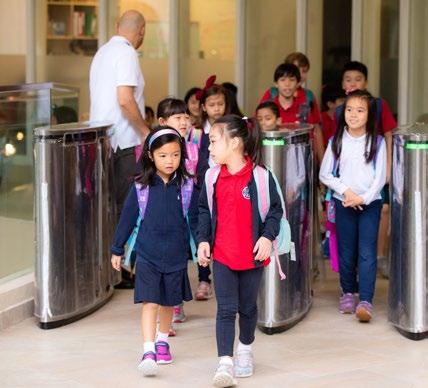
• All of South Bay Close
• All of South Bay Road including 74-80 and 82-86 Repulse Bay Road which are accessed from South Bay Road
• All complexes on Repulse Bay Road between Repulse Bay Garden (24 Belleview Drive) to the Lily (129 Repulse Bay Road) including the following addresses on Repulse Bay Road: 94, 96, 98, 101, 109, 111, 113, 115, 117, 119A, 121, 123, 125, 127, 129.
All walkers in Repulse Bay will enter and exit the building at the main entrance of Lower Primary. Parent and authorized person will need to sign them off with office staff every time before they leave. Families who want their students to walk must complete the HKIS Walking Agreement, available in PowerSchool..
n Rainy Days
Walkers may register at the beginning of the school year to be a "Rainy Day Bus Rider." This is an ad hoc service and dependent on seats being available on the bus. Each ride costs $50 and only registered students are permitted to use it. Please complete the "Rainy Day Bus Rider" registration information in PowerSchool.
HKIS ID Cards
All HKIS employees, students, and parents to the school are required to use an HKIS ID card at the main entrance to gain access to the Repulse Bay and Tai Tam campuses, when boarding buses, and to borrow books from the libraries. An HKIS ID card is your evidence of being an HKIS community member. You should carry or display your card at all times when on HKIS property and present it at the entrance to school and upon the request of an HKIS employee (High School Students: Especially
28 Hong Kong International School
when using “Come Late Privileges,” “Senior Privileges,” and school events in the evenings or on weekends).
n HKIS ID Cards for New Families
• All HKIS students are issued with ID cards once accepted into HKIS.
• It is recommended that all new parents submit an application for a HKIS Parent ID. The HKIS Parent ID card means you do not need to register as a visitor each time you enter campus.
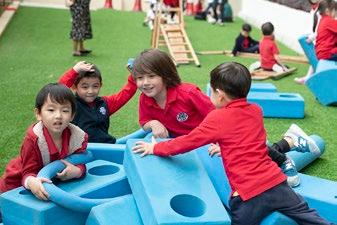
• Log in to PowerSchool and complete the “HKIS ID Card Application/Replacement/ Renewal” form to apply for a card.
• New families may request HKIS ID cards for themselves or guardians by submitting the card application form through PowerSchool.
• Divisional offices will distribute new student and parent HKIS ID cards in August, usually during the New Family Orientation or Back to School Night, prior to the start of school.
n Returning Students
• To ensure a student’s ID photo is up-to-date, returning HKIS Student ID cards are re-issued when a student enters into a new division (Reception 1, Grade 3, Grade 6 and Grade 9).
• Divisional offices distribute the HKIS ID cards to R1, G3, G6 and G9 students in August.
• If a student loses their HKIS ID Card, a replacement card will be issued at the cost of $100.
n Returning Parents
• All HKIS parents are required to have an HKIS ID card to access campus, both during school hours and for events that take place after school or on weekends.
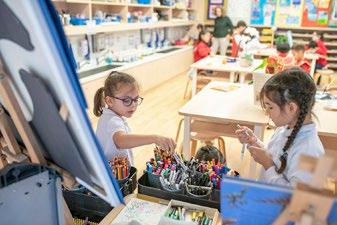
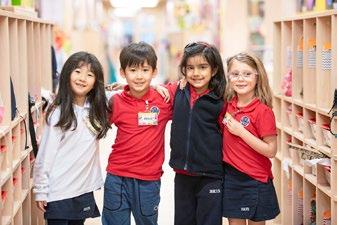
• If you have a card already, it will remain active as long as your children are enrolled in the school, so please hold onto it and use it when accessing campus.
n Replacement Cards
• To replace lost, stolen, or damaged cards, please log in to PowerSchool and complete the “HKIS ID Card Application/Replacement/Renewal” Form.
• There is a $100 charge for replacement cards, so please keep your cards in a safe place.
n HKIS-Sponsored Cards
• You may also apply to have an HKIS ID card issued for other family or household members, such as grandparents or helpers.
• These cards are considered “sponsored cards” and there is a fee for issuance plus an annual renewal fee.
• Sponsored cards can only be used to enter and leave school premises, they cannot be used to borrow library books or board buses.
n Visitors Accessing Campus
Guests invited by HKIS may access campus with an appointment registered through our Visitor Management System (VMS). They will be issued a VMS barcode letter which they should bring to expedite registration at the gate. HKIS will issue a pass to visitors, which they are required to wear while on campus.
In addition, HKIS will require guests to comply with current rules to protect the health of those on campus such as: Scanning the campus's Leave Home Safe QR code, meeting any "vaccine pass" government requirements, producing a photo of a sameday negative Rapid Antigen Test result, and a temperature check on site. Please email our Security Team at security@hkis.edu.hk with any questions.
NOTE: If you forget your HKIS ID card, you will be required to sign in as a visitor.
Lower Primary Parent Handbook 29
n Using your HKIS Card at Divisional Libraries
Each student’s card is printed with a library membership number. Library membership is available to students, parents, and employees.
n Help with HKIS ID Cards
If you have any questions or problems with your card, please email idcard@hkis.edu. hk.
Parent Volunteers and Visitors in Lower Primary
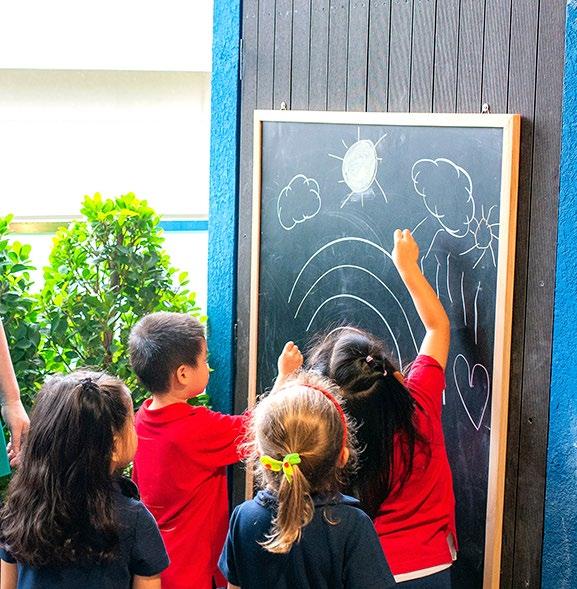
In order to ensure a safe environment within our school, we require all visitors to check in at the guard’s station before entering the building, as well as with the LP office. You will be given a school visitor’s badge to wear around your neck while you are in the building. Parents and helpers may also apply for an HKIS ID card, through the school office. Please see the HKIS ID Cards section for more information.
Each year we receive requests to have former students or visiting friends spend time in Lower Primary classrooms. Requests for such visits should be made in advance to the Lower Primary Principal and Associate Principals. Providing they do not disrupt the class routines or distract students, and with the consent and input of homeroom teachers, such visits may be authorized for a couple of hours during the school day. Visits will not be permitted during days that include special events, field trips or other times when the teacher or administrators feel visitors might distract from the school program.
Parking
There is no parking available at Repulse Bay. The police regularly ticket those parked on the street. We encourage parents to come by taxi or public bus.
Phoning HKIS
When the need arises to contact your child during the school day, please come by or call the office on 2812 5130 for assistance. We ask that you do not call the classrooms directly.
Picking Up Students During the Day for Special Circumstances
If it becomes necessary to pick your child up during the school day for special circumstances (illness, doctor appointments), please sign your child out at the Lower Primary office and receive a pass before taking your child. Students must be picked up by 1:00 p.m. for R1 and R2 students and by 1:30 p.m. for G1 and G2 students at the latest, unless there is specific approval from the administrator. Only those adults who are listed on the system as parents or emergency contacts will be allowed to pick up a child.
If your child is ill or needs to leave early and you want your driver or helper to pick them up, you will have to fill in the private transportation release disclaimer in PowerSchool. This will give your driver or helper permission to pick up your child. If this disclaimer has not been filled in or your child is significantly ill or injured only parents will be allowed to pick students up.
Weather Warnings Procedures
The safety of our students and staff is our priority, so in the event of extreme weather it may be necessary to modify our school schedules.
Parents are advised to use their best judgment in determining whether to send their children to school in the case of bad weather or dangerous road conditions.
In the event of special weather arrangements, the Education Bureau will make a decision at or before 6 a.m. and this information will be distributed to the media. For current information please refer to their guidelines at www.edb.gov.hk/
30 Hong Kong International School
Under normal circumstances, HKIS will follow the government’s recommendation. HKIS will not call parents directly. Alerts will be posted on the website and DragonNet. Parents are responsible for checking for any announcements.
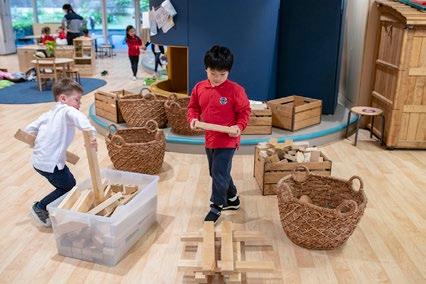
Please note there are times when localized weather conditions on the South side of the island are very different from territory-wide predictions. In circumstances where HKIS needs to take action different from the government’s recommendation, parents will be alerted and notices will be posted online.
Generally speaking, HKIS will wait for an official announcement from Hong Kong’s Education Bureau before notifying the community about school closures (due to bad weather or health considerations such as flu outbreaks). On occasion, these announcements take time to come out, and, in that time, some news outlets and community members try to anticipate whether the Education Bureau will close schools or not. Please rest assured that HKIS will contact parents and employees with news of any closure once official word has been received. If the signal is raised before school starts:
Typhoon 1 All R1-12 classes are in session.
Typhoon 3 R1 classes are cancelled. R2-12 classes are in session.
Typhoon 8 and above School is closed. Learning activities will be determined based on the situation.
Amber Rainstorm All R1-12 classes are in session.
Red Rainstorm School is closed. Learning activities will be determined based on the situation.
Black Rainstorm School is closed. Learning activities will be determined based on the situation.
When the signal is raised during school hours:
At times a typhoon increases in intensity or a rainstorm signal is raised while the children are at school. If this happens, we will use the following procedures:
Typhoon 1
Typhoon 3
Typhoon 8 and above
Amber Rainstorm
Red Rainstorm
All R1-12 classes will remain in session with regular dismissal times.
All R1-12 classes will remain in session with regular dismissal times.
All R1-12 classes will be dismissed. (The notice of Typhoon 8 signal being raised is given to schools several hours before it is actually hoisted, thus allowing schools enough time to make arrangements to get students home safely.)
All R1-12 classes will remain in session with regular dismissal times.
All R1-12 classes will remain in session AND* students will remain in school until conditions are safe for them to return home.
Black Rainstorm
All R1-12 classes will remain in session AND* students will remain in school until conditions are safe for them to return home.
* This means students will not be released until the warning has been removed and buses are authorized for safe travel, which could be after 3 p.m. Please note that the HK government strongly advises everyone to stay indoors during a Black Rainstorm warning. Driving yourself or sending someone to pick up your child during a Black Rainstorm signal is extremely dangerous and not advisable.
Lower Primary Parent Handbook 31
Note: In the case of a Typhoon 8 signal when we must dismiss the children prior to the end of the regular school day, parents will be contacted with the approximate new dismissal time. It is critical that you discuss with your family and your helper the new arrival time and determine who will be waiting at the bus stop for your child. If your child regularly walks home or is picked up by car, please be prepared to come immediately to school and pick up your child at the normal meeting place.
Buses will run and complete their routes if school is in session or when students are onboard. Any variation to the regular schedule will be the decision of the bus company in consultation with the school administration.
For information regarding weather conditions, we recommend the following sources:
Hong Kong Observatory website: www.weather.gov.hk
Hong Kong Observatory telephone: 187-8200 (Press 1 for Cantonese, 2 for Mandarin, 3 for English)
RTHK – Radio 3: FM 97.9 (Central and environs) or FM 106.8 (Southern Hong Kong Island)
Health and Safety Behavior and Discipline
The ethos of Lower Primary is to foster effective learning and to shape positive patterns of behavior for all of our students. We do this by providing an appropriate curriculum for all students, and involving them in discussions about the importance of our character development SLR and the value of being a positive contributor to the classroom community. These discussions happen in lessons and throughout the school day. We want each of our students to develop a genuine feeling of belonging to the school, and the associated feelings of self-esteem.
At the start of each school year, every class works out classroom rules. These will be specific to each class. Students’ positive behavior is reinforced by teachers in a variety of ways to help students internalize the value in behaving appropriately. As students mature and develop, we hope to foster intrinsic motivation rather than motivation based on praise and reward.
Four Bees
Students, faculty and staff are expected to uphold these values: Safety, Kindness, Respect, and Responsibility, to ensure teaching and learning are the primary focus and to allow students every opportunity to excel.
While consistency is a key component when managing student behavior, it is understood that each case is unique. Should students make inappropriate choices on the playground, in the classroom or elsewhere on HKIS property or while on school buses, a reflective conversation will be held in order to support the growth of each child. The reflective conversation will revolve around the Four Bees and students may complete a reflection sheet that will be signed by parents to ensure school-home communication is addressed.
Health Office
The divisional Health Offices at Hong Kong International School offer professional health services, knowledge, care and support to students, faculty and staff. They play a vital role in the promotion of health and wellbeing. Each division has its own dedicated school nurse.
The Lower Primary (LP) health office is located at our Repulse Bay campus on the first floor near the main LP administration office area in room 107. Our nurses are on duty from 7:30 a.m. – 3:30 p.m. The LP health office telephone number is 2812-5117. The health office email is lpsnurse@hkis.edu.hk
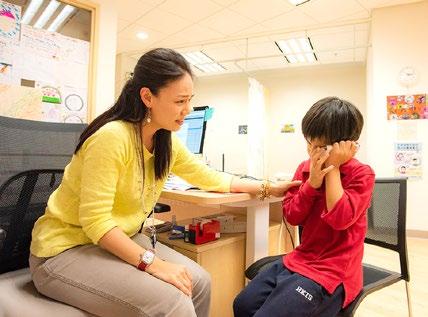
32 Hong Kong International School
The objectives of the LP health office are the following:
• Offer first aid and assistance to children who become ill or injured at school.
• Authorize and arrange for children to be sent home in cases of illness or injury.
• Dispense medications needed during the school day.
• Maintain health records and assist in the overall health program.
• Monitor and communicate spread of communicable diseases.
• Monitor and communicate AQHI (pollution) levels.
• Supervise readmission of children to school after major illnesses, communicable disease or injury.

• Offer vision and hearing screenings.
n Health Information and Forms
All students new to HKIS must submit:
• Physical Examination Form, to be completed and signed by a medical doctor within the last six months.
• “Family” information under the Demographic Updates section of PowerSchool. Please ensure this is kept current at the beginning of every school year or when any changes occur.
All mandatory health forms (Student Health Information, Allergy Information and Medication Administration Consent forms) can be found and completed in PowerSchool. Exception: Physical Examination (PE) form. Please download the PE form from PowerSchool Forms, print it, have it completed by your child’s physician, and then upload a scan or photo of the completed and signed form into the PowerSchool mandatory forms section: “4: New Student Physical Examination Form”. All returning students to HKIS must submit:
• “Family” information under the Demographic Updates section of PowerSchool. Please ensure this is kept current at the beginning of each school year, or when any changes occur.
n Emergency Contact Information
The Family information in the demographics section of PowerSchool must be completed online for each child at the beginning of every school year. The information on this form is very important. It has emergency contact numbers, information about allergies/medical conditions, consent to medication and authorizations for hospital care. Please remember to update information on this form as changes occur, since teachers and the nurse refer to it throughout the year.
n Medication During School Hours
Our school nurses may not dispense any medication without parental consent. Students are not allowed to carry any medication with them during school hours except for Epi/Jext Pens, diabetic kits and asthma inhalers. If your doctor prescribes a medication that must be taken during school hours, you must complete and submit a Medication Administration Consent form, found in PowerSchool Forms.
Students who use Epi/Jext Pens: Parents will supply two pens to the LP health office in case of emergencies. Please check all medication expiration dates before submission. If your child requires Epi/Jet Pens at school please fill out an Allergy Information Form and Medication Administration Consent form, found in PowerSchool Forms.
n Medical Policies and Guidelines
If your child should become ill during school hours, you will be contacted to make arrangements for him or her to be taken home as soon as possible. A doctor’s note is required following an absence of four or more consecutive school days, stating the child is well enough to return to school, and whether there are any physical restrictions. If your child has a contagious disease and illness, please contact the school nurse, who will advise you on the procedures about returning to school.
Lower Primary Parent Handbook 33
Students will either be sent home, or should stay home, if they experience any of these conditions:
• Fever: Students with a temperature of 37.5°C or 99.5°F or greater should not return to school until they have been fever free for 48 hours, without the benefit of fever-reducing medications such as Panadol and Ibuprofen.
• Vomiting and Diarrhea: Students with vomiting due to illness or diarrhea should not return to school until 24 hours after the last episode of vomiting or diarrhea. The student needs to be asymptomatic for 24 hours without the use of medication.
• Covid-19: Students should not return to school until a negative RAT test result is obtained (*refer to current Risk & Response Matrix in Dragonnet).
• Influenza: Students should not return to school until fully recovered or advised by a doctor AND until 48 hours fever free, in accordance with the fever policy.
• Impetigo: Students should not return to school until 24 hours after antibiotic treatment and affected areas are covered.
• Acute Conjunctivitis: Commonly known as “pink eye,” which is contagious, students should not return to school until being seen by a doctor, prescribed eye drops have been used for 24 hours and abnormal eye secretions have resolved.
• Hand, Foot and Mouth Disease: Students should not return to school until all open sores have healed and as advised by a doctor.
• Scarlet Fever/Strep Throat: Students should not return to school until 24 hours after antibiotic treatment AND until 48 hours fever free, in accordance with the fever policy.
• Chickenpox: Students should not return to school for five days or until all open sores have healed AND until 48 hours fever free in accordance with our fever policy, AND as advised by a doctor.
• Head Lice: Lice can be highly communicable and difficult to prevent, but if every parent takes the responsibility to check the entire family periodically, these parasites can be prevented, detected early and controlled. If live lice are found during school hours the student will be sent home. The student should not return to school until all live lice have been removed. The nurse will check the student for lice and nits before the student is allowed to return to class.
• Any Potential Contagious Illness: If your child has been asked to rule out a contagious illness by the school or further information is needed, a doctor's note of clarification may be required.
n Child Vaccinations
It is important to ensure your child's vaccinations are up to date according to the vaccination schedule recommended by the Department of Health, Hong Kong. If your child was born outside Hong Kong the vaccination schedule may differ slightly; we recommend that you direct any questions to your local medical doctor.
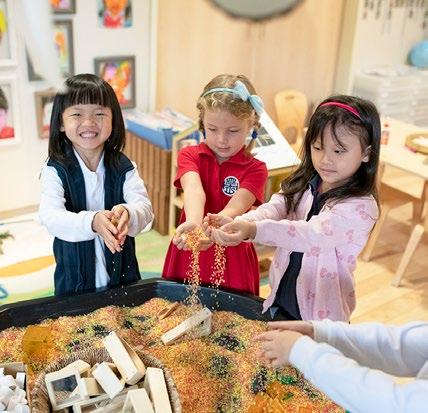
Please note: HKIS does not provide any childhood vaccinations, these will need to be administered at the private doctor's office or a government clinic. For government clinics, you could contact the School Immunization Teams (SIT) at 26158585. They could arrange vaccinations for your child at their SIT clinics but booking an appointment in advance is required.
n Air Quality Health Index (AQHI)
The Hong Kong Environmental Protection Department uses the Air Quality Health Index (AQHI) to advise the public about day-to-day risks associated with air pollution. The nurse checks the AQHI regularly throughout the day and advises when the levels reach 6, 8 or 10 and above, so appropriate measures can be taken.
34 Hong Kong International School
HKIS uses the following benchmarks:
• AQHI levels 1-5 at Eastern Station: No restriction on student activities.
• AQHI levels 6-7 at Eastern Station: Students with asthma and other respiratory or cardiac conditions will be advised to limit their outdoor physical activities. LP students on the AQHI list will be kept indoors.
• AQHI levels 8-10 at Eastern Station: There will be indoor recess and PE for all LP students.
• AQHI levels 10+ at Eastern Station: All outside activities are cancelled. Indoor PE activities will be modified for all students. All outside after school activities will be cancelled.
Nut-Aware/Nut-Free Policy Lower Primary is a Nut-Aware/Nut-Free Zone
As part of the safety measures at HKIS, Lower Primary adheres to a total Nut-Aware/Nut-Free policy throughout the entire campus. This includes food at school-related activities. Parents and children need to be mindful of any products containing nuts when preparing lunches or snacks. Parents of children who historically have suffered an anaphylactic reaction to any foods or insect bites need to provide the school with an updated Allergy Information form located in PowerSchool Forms.
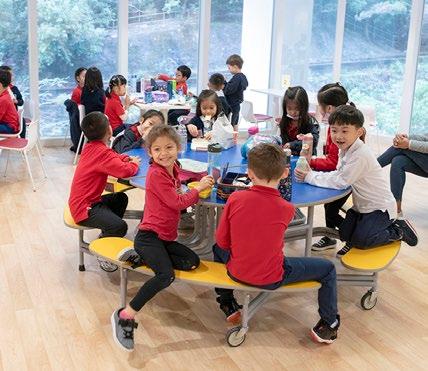
This policy is for all Lower Primary students, due to the ages and level of responsibility in the early years of education, in order to keep everyone safe in the building.
We expect all members of the LP community to adhere to the following guidelines:
Do NOT send any of the following items to school:
• Nut products.
• Foods cooked in peanut/tree nut (almond) oil.
• Spread containing nuts (peanut butter, Nutella).
• Muesli bars, biscuits or other products listing nuts as an ingredient.
• Packages of mixed fruit (trail mix) containing nuts.
• Recycled containers that may have contained nuts (cereal boxes, peanut butter jars, biscuits or cookies).
• Food items with labels stating “processed in a facility that also processes nuts” or “may contain nuts”.
Please also remember:
• All students with moderate to severe nut allergies are required to have an Epi/ Jext pen in the health office.
• Do not use nut ingredients if preparing food for a special school event (birthday cake, cultural food, sports day picnic, field trips).
• Do not apply lotions, creams, lip balms, etc. that have nut derivatives as ingredient (almond oil, coconut oil).
• If your child eats a nut product for breakfast (peanut butter on toast), washing hands and brushing teeth before arriving at school will reduce the chance of exposing an allergic child to a nut allergen (on the bus, bathrooms, playground).
• Inform helpers and grandparents/family members of LP Nut-Aware/Nut-Free policy.
Lower Primary Parent Handbook 35
If your child has any food allergies, intolerances or sensitivities consider bringing home lunch.
Please know, while we will do our best to monitor and enforce these parameters and food rules, there are occasions when mistakes are made and nut products enter our school. Along with these parameters and food rules, we encourage you to teach selfadvocacy skills to your child if he/she has an allergy.
Pets in School
In the interest of maintaining a safe and healthy school environment for our students, we discourage the practice of having family pets visit classrooms to reduce student exposure to allergens. Welfare of the children and animals is also a concern, as classroom visits that may expose the animal to an unfamiliar setting with a large number of students may lead to unpredictable behavior. Any exceptions to this policy must be approved by the principal or associate principal.
Phone-Free Zone Policy
In order to model the value of learning in our community, Lower Primary at HKIS is a Phone-Free Zone. We acknowledge this can be challenging, but it is at the core of our educational philosophy.
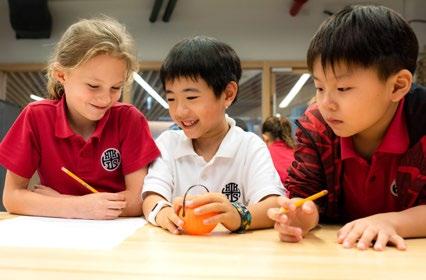
We want our students, your children, to know they are important, and that their learning is valuable. We also know that children learn by watching the behaviors of the adults around them. So we teach them they are valuable, that their learning matters, by giving them our focused, phone-free attention. For example, parent experiences and activities such as lunch bunch, field trips, and mystery reading should be focused on connection between parent and child. We want our adults to walk throughout the building not looking at mobile phones or devices, but instead model to students how to be mindful of their environment.
Phone-Free Zone etiquette means:
• We ask parents and guests to put phones away when in the presence of children on campus.
• Should the need arise, please use your phone only in spaces designated for adults, which includes our lobby area or outside the main entrance. There are seating areas in both. Should you need to make an emergency call, please ask our receptionist if a private space is available.
What about cameras? Guided by the classroom teacher, photography and filming are welcomed. Photography and filming at school-wide events, however, is strongly discouraged, as it interferes with the experience of other families and distracts students from sharing their hard work. Please refer to the photography guidelines in HKIS's Social Media Policy (Policy 3180, available on DragonNet)
Safety and Accidents Procedures
HKIS puts safety first at all times. We maintain all equipment to a high standard and regularly check for problems. In the event of an accident, HKIS employees will follow the detailed protocol laid out in the Lower Primary's Schools "Critical Incident Plan", which includes:
1. Assessing the seriousness of the situation.
2. Sending the child to the nurse for further evaluation if the child requires medical attention.
3. Assessing the need for further medical treatment and informing parents of the need for this treatment, if required.
We also hold regular fire drills and emergency evacuation drills. We are in regular communication with Hong Kong safety authorities. We take any incident seriously, and we have careful plans in place for evacuation and for the security of every student. After consulting with police, fire or other security experts in Hong Kong, we determine the best course of action and return to normal school life as soon as
36 Hong Kong International School
possible. In the event of an external emergency that occurs during school hours, HKIS will keep students at school until appropriate instructions are issued. We will also follow any directions broadcast by the Hong Kong Education Bureau.
Disruptions to School Operations and Virtual Home Learning
HKIS follows Hong Kong's Education Bureau (EDB) operational requirements for schools during the Covid-19 pandemic. In addition, HKIS has developed systems and procedures to keep our community safe while minimizing disruption to student life and learning. Visit HKIS Central on DragonNet to view the latest information and FAQs, including HKIS's Risk and Response Matrix.
In the event of school closure relating to health or other disruptions, virtual home learning will resume where possible. Parents and students should refer to DragonNet for links to these resources.
Parent Involvement Gifts and Entertainment
HKIS has a policy on the non-solicitation and acceptance of gifts by HKIS faculty and staff. We understand that grateful parents may wish to give small gifts to their children’s teachers or other employees to express appreciation. The best gift a teacher can receive is a genuine and personal expression of gratitude. A thoughtful thank you will have more impact than a lavish gift. If, in addition to any personal thank you, you or your child wishes to give a small gift, employees have been instructed that they may not accept gifts valued over HK$200 and not in the form of cash.
Invitations to lunch, dinner and social events or to participate in Annual Fund events are acceptable as an appreciation of thanks.
Parent Groups n Annual Fund Committee
The Annual Fund Committee is a parent-led group that works closely with the School’s Advancement Office to encourage giving to the HKIS Annual Fund. The Annual Fund supports the daily operation of the School, providing immediate-use funds to enhance the experience of every student at HKIS.
The AFC also works with the Advancement Committee under the HKIS Board of Managers. To find out more about how you can help the AFC, contact annualfund@ hkis.edu.hk.
n Booster Club + Dragon Shop
The HKIS Booster Club is a parent-run volunteer organization whose mission is to support athletics, extracurricular activities, spread school spirit and maintain the Dragon Shop. The Dragon Shop is your one stop shop for uniforms, school supplies and HKIS themed spirit gear. All profits generated from our Dragon Shop sales return back to our school community in the form of grants and support to our Dragon athletics, arts, student clubs, special projects and spirit events. The money you spend at the Dragon Shop helps fund multiple and diverse initiatives across all four divisions at HKIS, as our way to ensure that your support helps enhance the educational experiences of all students.
All parents in our community can shop at the Dragon Shop by visiting our store, in person or online, to purchase school uniforms, spirit gear, gift items and school supplies. With the help of over 60 parent volunteers, the Dragon shop sells all HKIS uniforms for Lower Primary, Upper Primary, Middle School and physical education. Our parent shop volunteers are trained to help you find the perfect fit and ensure you have everything you need for the start of school. Our shop is located on the 2nd Floor of the High School Campus at 1 Redhill Road, Tai Tam, across from the High School
Lower Primary Parent Handbook 37
Cafeteria. For your convenience, we are also available online at https://hkis-dragonshop.myshopify.com, and you can now also find our uniform sample racks at the Lower and Upper Primary offices with a QR code for easy access link to our online store.
Please visit https://www.hkis.edu.hk/community/booster-club/dragon-shop to find the HKIS uniform requirements by division and the Booster Club's Dragon Shop hour.
If you would like to volunteer during Booster Club events or at the Dragon Shop, please visit our website at https://www.hkis.edu.hk/community/booster-club/ welcome-boosterclub
n Parent Advisory Group
The Parent Advisory Group (PAG) is a diverse group of parents and faculty representatives dedicated to fostering a positive and collaborative relationship between the parents, administration and faculty of the Lower Primary in an endeavor to improve the school, its curriculum and programs. PAG provides structured avenues for parental input into the operation of the LP division, and involves selected parents in the work of enhancing communication and partnership between parents and staff. Membership is by invitation of the LP principal. Interested parents may apply by completing an application form found on the HKIS website. In order to be eligible for PAG, parents must have at least one child attending Lower Primary. Membership is a minimum of two years.
n Parent Faculty Organization (PFO)
All HKIS parents, students and faculty are members of the PFO. There is no need to apply.
The main purpose of PFO is to build a positive community by involving and engaging all parents, students and faculty. The PFO impacts the HKIS community by organizing and sponsoring events that connect all divisions and raise funds to further enrich the student experience. We are a 100% volunteer run organization.
The PFO organizes many events throughout the school year. New parents are invited to join the New Families Facebook group to connect with other families new to school. The PFO hosts New Parent events twice a year – in August and January – to help integrate and familiarize parents with the school and community. Twice a year, the PFO brings the entire school community together to celebrate the Pumpkin Festival (in fall) and the World's Fair (in spring).
The PFO also sponsors and organizes the LP Book Fair, Teacher Appreciation, Giving Thanks week, HK walkabouts for faculties and parents, Student volunteer reward program, HS Hackathon, HS Merit Scholarships, a flower market for LP & UP and Chinese New Year Assemblies for all divisions. Furthermore, the PFO supports various division specific activities through the allocation of funds to projects in each division.
Engage with us by following PFO on IG and FB @hkispfo and join us to volunteer for PFO activities by visiting PFO page in the community section of the HKIS website https://www.hkis.edu.hk/community/pfo/welcome. You can also reach out to us by email at pfo@hkis.edu.hk.
Parents’ Presence in Hong Kong n Residency
An enrollment requirement of HKIS is for all students to have at least one parent in full-time residence in Hong Kong.
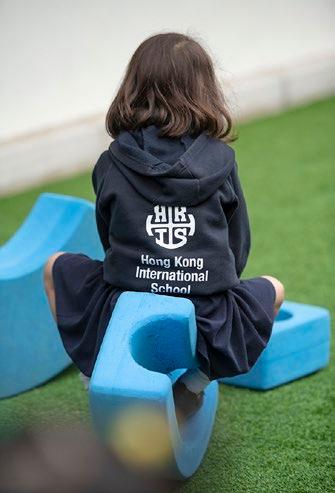
n Temporary Absence from Hong Kong
If during the school year both parents plan to leave Hong Kong for one or more days while a child remains in residence, one or more temporary guardians must be appointed to make any necessary decisions regarding the child’s welfare.
38 Hong Kong International School
A “Notification of Both Parents’ Absence from Hong Kong” form must be completed in PowerSchool each time both parents plan to be absent from Hong Kong. It must be submitted to the student’s divisional administration office as far in advance as possible.
The “Appointment of Temporary Guardians” form (available in PowerSchool) must also must also be completed and returned to the student’s divisional administration office as soon as possible before the FIRST planned departure of both parents from Hong Kong. The completion of one of these forms each school year is sufficient, as long as the appointed temporary guardian information has not changed.
Parents who do not arrange for and inform the school of the child’s supervision and guardianship may jeopardize the child’s continued enrollment at HKIS.
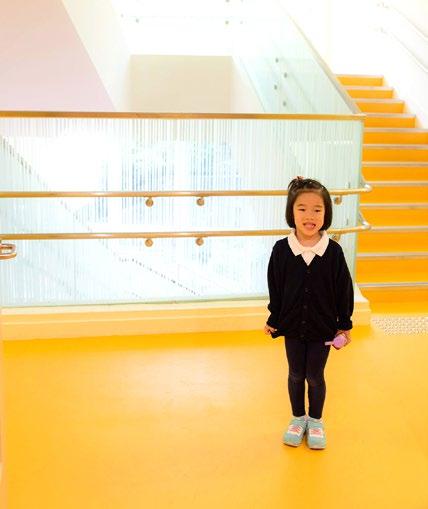
Please note the importance of notifying the school when both parents are leaving Hong Kong, as this helps a great deal in understanding and working with your child in class. The completed form is essential in case your child is injured and emergency medical treatment is required. The form must include all necessary information (such as guardianship, contacts, address and telephone numbers).
Separated or Divorced Parents
Child Care Arrangements in the Event of Marital Separation/Divorce
This administrative policy applies to all separated or divorced parents of HKIS students.
HKIS understands that special custody, access and permission arrangements may be required for the children of divorced or legally separated parents. As such, HKIS attempts to accommodate the desires of the both parents and court orders, within reason. HKIS does follow legal guardianship directions from Hong Kong courts in accordance with the school’s policies. Note that court orders relating to childcare and custody obtained from foreign jurisdictions are generally not recognized in Hong Kong unless the parties specifically seek a “mirror” order in Hong Kong.
HKIS always defaults to what the school believes is best for the student. Nevertheless, in some cases when parents cannot reach agreement and/or the school cannot accommodate the parents’ requirements (within reason), HKIS’s final response may be to withdraw the student's enrollment.
In order to document the terms by which the parents’ jointly request HKIS to provide special custody, access and permission arrangements, a “Child Care Arrangements in the Event of Marital Separation/Divorce” form (the “Form”) must be completed for each student and signed by both parents through PowerSchool. Completion of this form is a requirement to ensure retention of the child’s enrollment at HKIS.
To the extent permitted by law, HKIS will abide solely by the arrangements set out in the Form, notwithstanding any court orders. In the event of any conflicts or disputes, parents are advised to seek clarification from the court. If the parents wish to vary the arrangements set out in the Form, they must inform HKIS in writing, and both parents must sign such notice.
The information provided in the Form will be used for HKIS's administration purposes and for determining relevant arrangements for the student. As such, the information provided will be made available to those HKIS staff responsible for the care of the student, which may include (but is not limited to) the student's teachers, the relevant teaching assistants, school counselors and/or the school nurse. If and when appropriate, HKIS may release certain relevant information to external providers operating services and activities in which the student participates as an HKIS student (e.g., providing information to extracurricular service providers regarding who may or may not collect the student following such activities).
Lower Primary Parent Handbook 39
Student Attendance and Absences
Consistent attendance is essential for a student’s growth and success in school. We support family experiences, but consistency and routines are essential in a child’s development.
The absence procedures are intended to accommodate sick days and family emergencies such as funerals or an ill family member. They are not intended to accommodate for extended family vacations. Extended holidays or vacation during the school year is highly discouraged. Student well-being is our top priority, as is supporting students who are absent for medical reasons.
Students are expected to be on time for school and for class. This is essential both for students’ individual learning and for the class as a whole. Students must be in attendance for 85% of the school days within each semester. If attendance falls below 85%, parents will be contacted and teachers may give the following semester report card grade: IE Insufficient Evidence – not enough information to accurately access the student.
Should a student’s absence exceed more than 25 school days during the academic year, he/she may be required to successfully complete an end of year assessment before being promoted to the next grade level. The decision for placement will rest solely with the LPS administration. After 10 days absent, parents will be informed in order to track days absent from school.
If an extended absence is planned, parents are asked to contact the office and inform the teacher. Teachers are unable to replicate the learning that occurs in the classroom, therefore, should a student have an extended absence, teachers will be unable to provide extra home learning. Daily reading is encouraged.
All students are expected to be on school grounds from the official start to the end of the school day. Permission for students to leave their school campus during school hours can only be granted by the principal of the school or his designee.
When your child is absent from school, please e-mail the classroom teacher
A doctor’s note is required following an absence of four or more consecutive days of major illness, communicable disease or injury. A doctor’s note may also be requested at the nurse’s discretion. The doctor’s note should state that the child may return to class and if there are any physical restrictions. For significant medical needs or concerns, please contact our nurse at 2812-5117.
n Early Leaving
Extended absences and early leaving for any reason other than illness are strongly discouraged. We plan our instructional program for the full year. We teach, practice and reinforce new concepts on a daily basis. In addition, classroom reading, writing and discussion form the basis for our theme learning. When absent, children will miss these valuable opportunities to verbalize and work with new instructional concepts. They also miss important opportunities to work as cooperative partners in groups. Children who miss many school days sometimes feel left out when they discover that the class has moved on to new topics or themes.
If children leave before the end of the school year, they miss special activities designed to bring closure to the school year.
Personal Property
End of Year Checkout Procedures
At the end of the school year students are expected to return all library books, text books, DVDs or other educational materials that have been loaned to them for the year. Students who have lost materials or books will be expected to pay replacement costs before report cards are issued. We ask that parents help develop their children’s sense of responsibility for school materials.
40 Hong Kong International School
Labels in Clothing and Other Belongings
Please label everything that your child brings to school, especially backpacks, lunch boxes, sweaters, sweatshirts, jackets and umbrellas. This will help in returning lost items.
A loop on the inside neckline of outerwear clothing is helpful for hanging on a closet hook.
Lost and Found
Unlabeled and unclaimed items found in classrooms, other parts of the building, on school buses or playgrounds will be placed in the lost and found boxes. The lost and found box is located in the LP office. Items that remain unclaimed will be donated.
Valuables/Toys
Children should not bring any valuables or toys to school. Examples of inappropriate items include iPods, cell phones, smart watches, toys, trading cards or jewelry. Children do not need to bring cash to school unless parents have been asked to pay for something school-related.
Lower Primary Parent Handbook 41
HKIS Shared Philosophy of Education
Only with a shared purpose and shared vocabulary can a large organization progress steadily in the right direction. Hong Kong International School, with a large and diverse population of students, faculty and community members must strive to remain focused on the path ahead, ensuring all are operating with the same milestones along that path in order to arrive at the same destination.
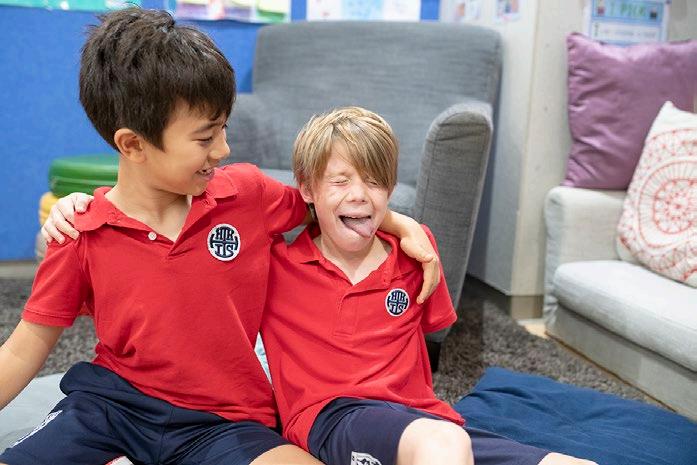
This Shared Philosophy of Education document assembles these milestones for ease of reference. In the Shared Philosophy of Education are presented those foundational principles upon which our practice and ethos are based. They are definitions of what we believe about our mission, what we desire for our students, how people learn, why and how we teach for understanding, and how best to assess the effect we are having in our work as a school. The documents collected in this single format have been created over the life of the school by all facets of the school community. Complementing one another in a unified definition of our work together, they comprise a shared vision for education at HKIS.
The HKIS Core Values
We believe that:
• Diversity enriches community and strengthens society.
• Life-long learning is vital for individuals to thrive in and contribute to a changing society.
• Society progresses when individuals strive for excellence and seek challenges.
• Learning thrives in the presence of shared high expectations and mutually respectful relationships.
• Integrity is essential to trust and credibility.
• Each human life has value and purpose.
• Dialogue about Christianity and other religions is valuable for personal growth and development of spiritual identity.
• Together, parents, faculty, staff, and students create the conditions for children’s success and a healthy lifestyle.
42 Hong Kong International School
SLR Operational Definitions
Academic Excellence
All students will be equipped and empowered to meet the challenges of a dynamic global society in which they collaborate, contribute and flourish as critical thinkers, problem solvers and creative individuals committed to excellence.
All students will demonstrate these abilities through:
Gathering Knowledge (Inquire; think critically; gather knowledge)
• Formulating and refining questions.
• Using a variety of resources.
• Finding, evaluating, selecting information.
• Making personal connections.
• Mastering technology tools.
Creating Understanding (Apply knowledge; draw conclusions; create new understanding)
• Applying critical-thinking skills (analysis, synthesis, evaluation, organization) to knowledge to construct new understandings.
• Collaborating to solve problems.
• Using technology tools to analyze and organize.
Communicating and Applying Learning (Communicate, use, and apply learning; practice ethical behaviors)
• Sharing new understandings and reflecting on the learning.
• Creating products to communicate new understandings effectively.
• Applying learning to new and/or real-life situations.
• Practicing responsible and ethical behavior.
Spirituality
Students will exhibit understanding of Christianity by:
• Describing and explaining the key principles of Christianity.
• Connecting Christian terminology and symbols to key principles.
• Making sense of the multiple ways the Bible is interpreted within the Christian community.
• Comparing key concepts, teachings, practices and texts of Christianity.
• Recognizing a connection between Christian principles and ethical conduct.
Students will exhibit understanding of other religions by:
• Describing and explaining the key principles of other religions.
• Connecting terminology and symbols from other religions to key principles from other religions.
• Making sense of the multiple ways other sacred writings are interpreted.
• Recognizing a connection between Christian principles and ethical conduct.
• Comparing key concepts, teachings, practices, and texts of other religions.
• Recognizing connections between the principles of other religions and ethical conduct.
Students will demonstrate respect for Christianity and other religions by:
• Respecting the religious rituals/spirituality of others.
• Respecting the diverse religious and spiritual lives and traditions of others.
Lower Primary Parent Handbook 43
Students will demonstrate their personal spiritual identities by:
• Engaging in dialogue about Christianity and other religious worldviews in daily life.
• Identifying connections with their personal beliefs and others.
• Reflecting upon their own spiritual identities.
• Living out their worldviews in a variety of ways.
Character Development
Students will demonstrate caring and respect by:
• Identifying others’ needs and looking for ways to help.
• Fostering care and respect in the community.
• Valuing the differences among people.
• Exhibiting self-control.
• Listening and interacting in an appropriate manner.
• Being considerate of materials, facilities and resources.
Students will exhibit integrity by:
• Demonstrating honesty and trustworthiness in relationships and academics.
• Accepting responsibility for their own actions.
Students will display the courage to stand up for what is right by:
• Identifying with a value system based on ethical principles.
• Speaking or acting in accordance with their values.
• Supporting others who speak or act with courage.
Self-Motivated Learning
Students demonstrate persistence and engagement by:
• Recognizing their intellectual style, strengths and weaknesses.
• Consistently applying different strategies to enhance interest until a goal is achieved.
• Sustaining or increasing effort in the face of difficulty.
• Actively seeking help when necessary.
Students exhibit risk-taking by:
• Applying new strategies to different assignments and projects.
• Seeking and engaging in challenging tasks that enhance learning.
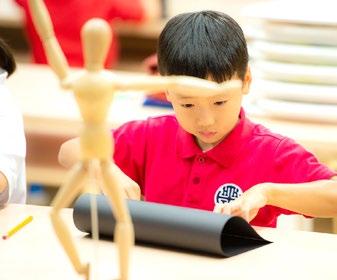
• Exploring new interests.
Students demonstrate application of a variety of learning and motivation strategies by:

• Engaging in effective thinking about their own thinking (metacognition).
• Knowing a variety of key learning and motivation strategies.
• Appropriately applying a variety of learning and motivation strategies.
• Respecting the diverse learning needs and styles of other students.
Students demonstrate control and regulation of their learning process by:
• Accurately self-assessing on an on-going basis.
• Continuously reflecting, setting, monitoring and revising goals.
• Accepting feedback and criticism without defensiveness.
• Adapting and adjusting learning and motivation strategies used to meet their needs.
44 Hong Kong International School
Students enjoy the process of learning and what they are learning by:
• Pursuing personal interests.
• Taking learning risks when their interest is piqued.
• Showing persistence in an area of passion.
Contributing to Society
Students will demonstrate appropriate interpersonal skills by:
• Working well with others.
• Respecting other points of view.
• Accepting diversity.
• Actively participating.
• Listening and making connections with others.
• Building cross cultural relationships.
• Working with others to achieve goals.
• Helping to resolve conflicts.
Students will make contributions by:
• Identifying a need.
• Voluntarily participating in service.
• Contributing time, talent or money, often involving a personal sacrifice.
• Appreciating the value of service.
• Contributing to family, community and/or the world.
• Following through on service commitments.
• Reflecting on service experiences.
• Studying in the classroom issues raised by their service experiences.
Students will exhibit global citizenship by:
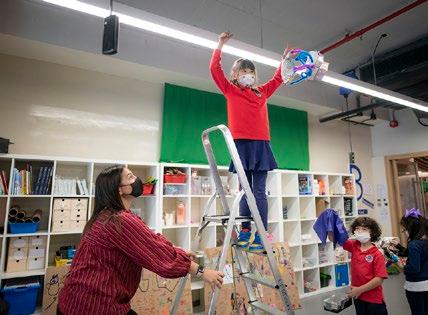
• Remaining conversant on current events.
• Being aware of the impact of major global, social and environmental events.
• Confronting discrimination and stereotypes.
• Appreciating global diversity.
• Developing a multi-cultural perspective.
• Empathizing with those representing a minority position.
Chinese Culture
Students will demonstrate understanding of China in each of the following areas:
• Social sciences (such as history, geography, politics and current events).
• Philosophy and religion.
• Language, literature and the arts.
• Chinese society (such as traditions and lifestyles).
Students will appreciate/experience Chinese Culture by:

• Making connections between personal experiences and aspects of Chinese culture.
• Being actively involved in a variety of Chinese cultural experiences.
• Behaving in culturally appropriate ways.
• Integrating with the people of Greater China and their communities.
Lower Primary Parent Handbook 45
Learning Principles and Practices
At HKIS we believe that learning is most effective when:
1. Learning is nurtured in a safe and supportive environment Therefore, we will:
• Build positive relationships.
• Seek ways to foster students’ enjoyment of learning.
• Build strong learning communities that promote a culture of respect.
• Promote students’ self-confidence, ability to see other perspectives, and willingness to take risks with their learning.
• Recognize mistakes as learning opportunities.
• Provide space and resources conducive to learning.
2. Learning is purposeful for life beyond school.
Therefore, we will:
• Connect with, challenge, and extend students’ present knowledge, skills, and understanding.
• Help students build skills in inquiry: asking probing questions and maintaining curiosity.
• Seek to connect students’ learning and the world at large.
• Focus on teaching for enduring understanding guided by essential questions.
3. Learning results in the transfer of knowledge and skills to a variety of contexts. Therefore, we will:
• Provide opportunities for students to raise questions, solve problems, and reason.
• Use instruction and assessment strategies that support the transfer of learning.
• Provide opportunities for students to demonstrate understanding by applying prior knowledge and skills to new challenges and experiences.
4. Learning is personalized
Therefore, we will:
• Use a range of strategies to identify and respond to students’ different learning and social needs, and cultural perspectives.
• Provide a variety of learning opportunities which enable students to build on personal strengths and interests.
• Empower students to advocate for their own learning as appropriate.
5. Learning is generated through interactions and integrated by the individual learner
Therefore, we will:
• Plan experiences that build and develop skills for learning through both collaboration and individual reflection.
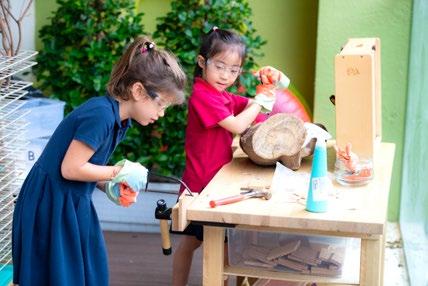
• Structure opportunities for students to learn with others inside and outside of the classroom.
6. Learning is enhanced by student engagement in metacognition i . Therefore, we will:
• Explicitly teach and model how to self-reflect, self-assess, and use feedback.
• Empower students to communicate about their own process of learning.
46 Hong Kong International School
7. Learning is informed by effective assessments that address clear expectations
Therefore, we will:
• Share and construct learning goals with students.
• Use formative and summative assessment as an ongoing part of the teaching and learning process.
• Assess understanding in various ways, including authentic, performance-based tasks.
• Use assessment data for teachers and students to guide future instruction and learning.
Teaching for Understanding
HKIS uses a comprehensive standards-based ii curriculum in which we teach for understanding. We align curriculum, instruction, and assessment to allow students to demonstrate understanding. Students understand when they:
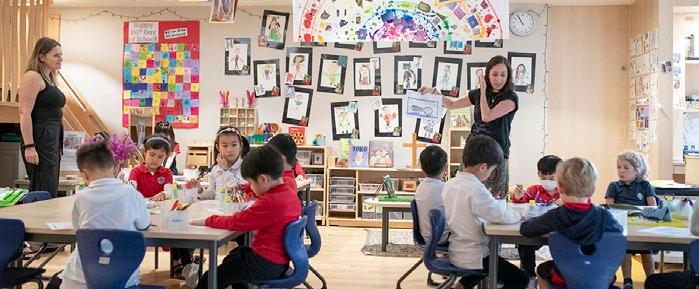
• Acquire important new knowledge and skills.
• Make meaning of big ideas related to the knowledge and skills.
• Transfer this learning to new and authentic situations (Wiggins & McTighe, in press).
The Understanding by Design (UbD) model, which seeks to structure teaching for understanding, guides us in the formulation of our written curriculum. Core principles of teaching for understanding include the following:
• Units of study and the classroom environment are structured around major concepts and principles known as enduring understandings. These understandings, derived from the standards and benchmarks, extend beyond a single subject area and have lasting value outside the classroom. These big ideas are abstract, not obvious, and require inquiry rather than limited coverage.
• Essential questions are used to raise student interest in the content of the unit and lead to development of the enduring understandings. Such questions are central to the curriculum and do not yield a single answer.
• Essential questions are explicitly stated for students at the outset of the unit and remain the focus throughout the unit’s duration.
• Specific knowledge and skills are taught so students learn requisite subject knowledge. These are aligned with the enduring understandings and essential questions.
• Multiple forms of assessment are used to allow students to demonstrate their understanding in various ways.
• Formative assessments iii are used to guide instruction and student goal-setting.
• Summative assessment iv tasks and accompanying evaluation criteria are made explicit to students as developmentally appropriate.
• Classroom instructional activities are all designed to engage students in building knowledge and skills and acquire understanding. Activities are differentiated to meet the needs of diverse learners.
Lower Primary Parent Handbook 47
Philosophy of Assessment
The purpose of assessment is to promote learning. Assessment is a process of gathering a variety of evidence to identify student’s level of attainment of learning goals. The evidence helps students understand their strengths and how they can improve their learning and helps teachers understand how they can improve instruction. In addition, assessment forms the basis of reporting to students and parents the current level of students’ attainment of learning goals. A robust system of assessment is relevant and accurate, ongoing, informative and timely, and understandable to all.
Relevant and Accurate
Assessment is tied directly to the learning goals of a given course or program. The goals are made explicit in the course’s standards and benchmarks as well as the schoolwide SLRs. Expectations around these goals are clear for all students as developmentally appropriate. Students need to know the level of attainment they are expected to reach as they work toward these clear learning goals. Likewise, measurement of attainment in these goals needs to be accurate, using a variety of methods appropriate to measure the targets set and appropriate to the age of the students.
Ongoing
Assessment is an ongoing process built into the cycles of teaching and learning. Though there are times (such as final exams in upper Grade) when assessment is a culmination of learning, in general assessment is incorporated into teaching and learning and the results of assessments are used by teachers and students to guide future learning.
Informative and Timely
Results and feedback are most useful when they are provided as close to the assessment as practical, so students and teachers can employ strategies for growth. Given the opportunity to reflect on results, students are able to set goals for future learning and performance of learning tasks that enhance progress.
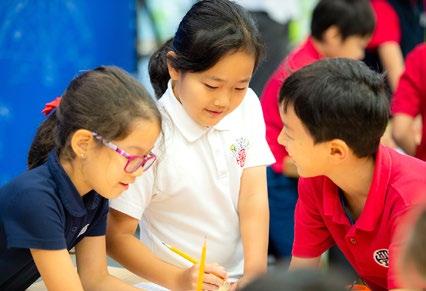
Understandable
As developmentally appropriate, students are fully involved in the assessment process and are able to understand and explain the ways in which assessment evaluates and enhances their learning.
Glossary
i Metacognition – The process of thinking about thinking. When students think about their own learning, it looks something like this: “I am having trouble with concepts like this, so I will try this strategy” or “I usually take a long time with this sort of task, so I will plan a little more time”. For very young learners, this may look in early stages like self-talk about what they are doing during play or project time.
ii Standards-based – Educational standards define the landscape of what students will learn in various subjects throughout school. In this sense, the curriculum is based on content standards that lay out important knowledge, skills, and understanding. The level to which these are to be achieved are laid out in benchmarks set for each Grade level.
iii Formative assessment – Assessment tasks that are designed to give students feedback over time that will enable them to set goals and move forward with their learning as opposed to making a final judgment about a student’s ability.
iv Summative assessment – Assessment tasks that are designed to capture a student’s performance at one point in time after instruction and to make a judgment about the student’s ability according to a Grade level benchmark. These assessments are used to inform report card grades.
48 Hong Kong International School
Lower Primary School Literacy Guide for
Parents 2023-2024
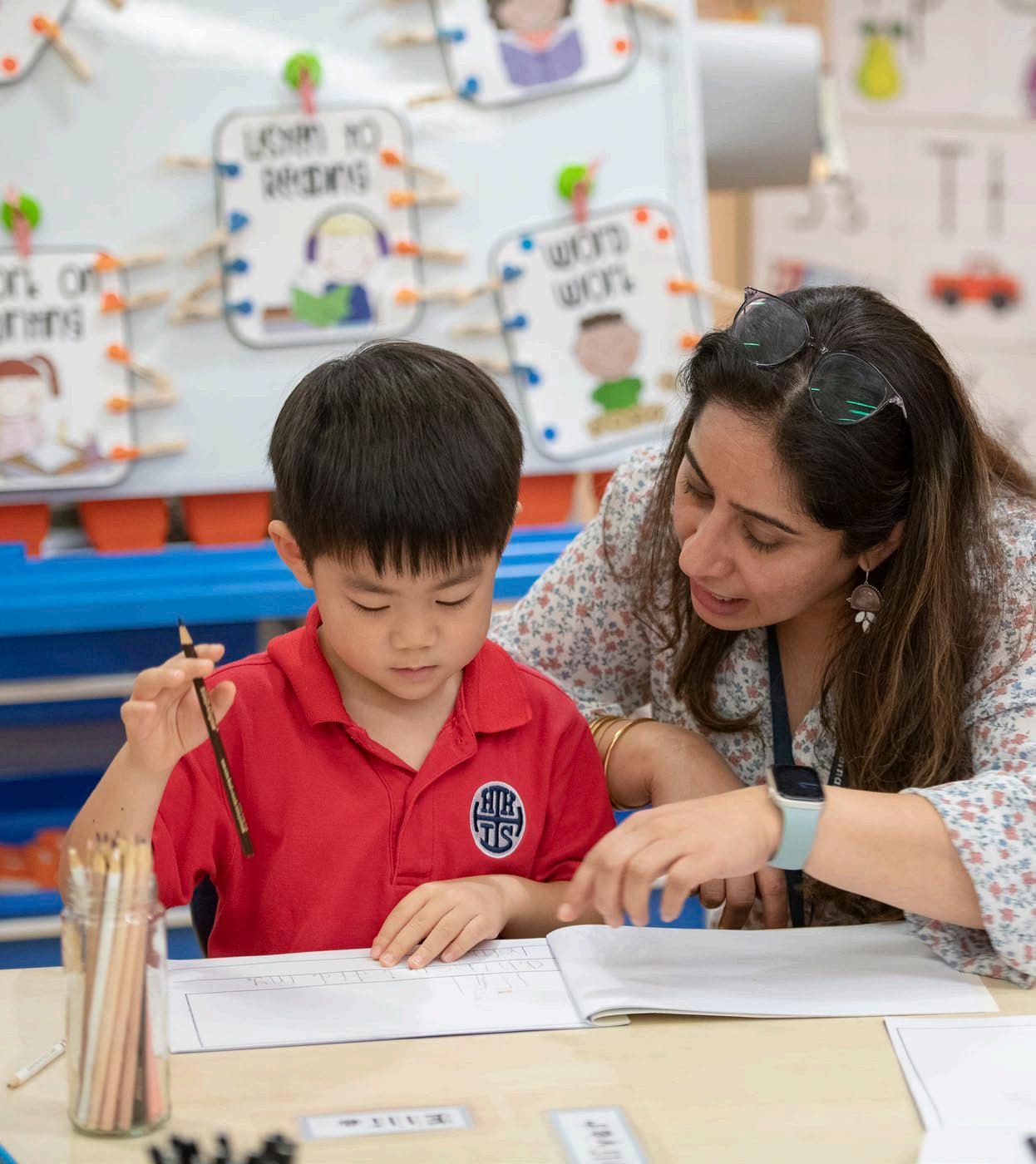
Reading & Writing
Key Skills for Success in School
A joint statement by the National Association for the Education of Young Children and the International Reading Association begins with this powerful declaration: “Learning to read and write is critical to a child’s success in school and later in life. One of the best predictors of whether a child will function competently in school and go on to contribute actively in our increasingly literate society is the level to which the child progresses in reading and writing. Although reading and writing abilities continue to develop throughout the life span, the early childhood years – from birth through age eight – are the most important period for literacy development.” (page 3)
In the Lower Primary, we believe that it is essential to teach children to read and write competently, enabling them to achieve today’s high standards of literacy. Our goal is to enable children to see themselves as able readers and writers and competent users of language for communication.
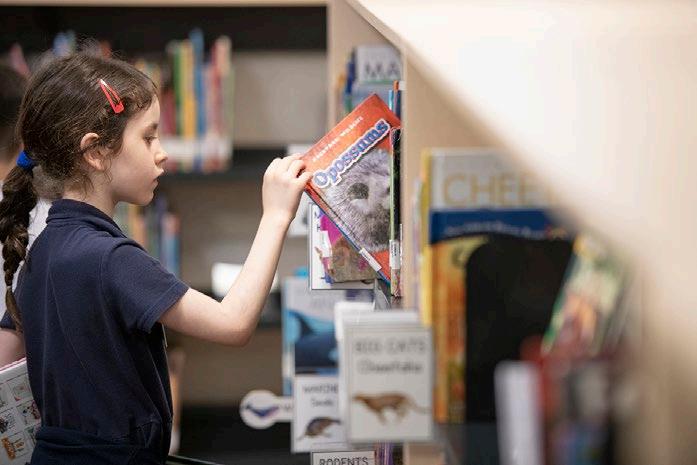
Through reading this guide you will:
• Be introduced to the Lower Primary literacy curriculum, including the Creative Curriculum and NAEYC standards as well as the Common Core Literacy standards.
• Understand the first six stages of literacy development through clear descriptions of the reading and writing continuum.
• Learn what research tells us about early literacy development.
• Learn ways you can support literacy development at home.
50 Hong Kong International School
Literacy Curriculum in the Lower Primary

Our literacy curriculum is based on best practices from the U.S. including research from Teacher’s College at Columbia University, National Standards of Teacher’s of English (NCTE), International Reading Association (IRA) and the work of Bonnie Campbell Hill, Ph.D., Matthew Glover and Kathy Collins. During the 2014-15 school year, HKIS adopted the Common Core State Standards (US 2010) to ensure consistency across Grades and divisions. Reception 1 is guided by The Creative Curriculum for Preschool Literacy Components and the NAEYC Standards (National Association for the Education of Young Children.) We believe both the CCSS and the NAEYC standards, enriched by our HKIS curriculum, will prepare our students for their academic success wherever in the world they may be.
Reception 1: The Creative Curriculum for Preschool Literacy Components and NAEYC Standards
Literacy in R1 encompasses the development of oral language as well as early reading and writing behaviors, attitudes and skills. Literacy in R1 begins through play. A literacy-enriched play environment exposes children to valuable print experiences and lets them practice narrative skills. The specific literacy components, as suggested by The Creative Curriculum for Preschool are:
• Literacy as a source of enjoyment emphasizes that children should experience the power, pleasure and purpose of literacy. Children are motivated to read because they are naturally curious to learn about things that interest them, uncover the plot of stories and, simply, discover something that entertains them.
• Vocabulary and language reminds us that oral language, listening and speaking, is the foundation of literacy. Children need to have ample opportunities to develop their vocabularies by speaking and listening through frequent conversations with each other and adults.
• Phonological awareness involves distinguishing the various sounds of spoken language. It includes the different ways oral language can be broken down into parts such as words, syllables, and letter sounds. Playful songs, rhymes and word games can be used to expose children to phonological awareness. As students are able to manipulate sounds in words, they build a stronger connection to print (phonics).
• Knowledge of print involves connecting print with meaning. Children acquire this knowledge by seeing print in their environment and using it in their play. Through this exploration, children will understand that print carries meaning, spoken words can be written down, print follows conventions and books have common characteristics.
• Letters and words focuses on understanding that a letter stands for one or more sounds, that sounds come together to form words and that words are grouped in particular ways and that writing has meaning. This work begins with exploring the letters in a child’s name and noticing these letters out in the world.
• Comprehension refers to the understanding of spoken and written language. Children who comprehend what has been read aloud may ask questions, make comments about the story or act it out in their play. A child who comprehends, doesn’t just recall words but constructs understanding.
• Books and other texts teach children that written language serves many purposes. To increase children’s understanding of books and texts, they need extensive experiences with a variety of genres since they are read differently. For example, storybooks, recipes, signs, directions, diagrams, poetry, informational texts, chapter books, mysteries…
Lower Primary Parent Handbook 51
Reception 2 - Grade 12: Common Core State Standards’ Capacities of a Literate Individual
The description below offers a portrait of students who meet the Common Core Standards. As students advance through the Grades and master the standards in reading, writing, speaking, listening, and language, they are able to exhibit with increasing fullness and regularity these capacities of the literate individual.
• Literate Individuals demonstrate independence in their thinking, seeking of resources and pursuing their interests.
• Literate Individuals build strong content knowledge when they learn to read purposely and listen attentively to peers and experts.
• Literate Individuals respond to the varying demands of audience, task, purpose and discipline by adapting their written and spoken messages.
• Literate Individuals comprehend as well as critique when they are engaged and maintain open-mindedness.
• Literate Individuals value evidence when supporting their own viewpoints in writing and speaking.
• Literate Individuals use technology and digital media strategically and capably to best communicate their ideas.
• Literate Individuals come to understand other perspectives, cultures and have the opportunity to vicariously inhabit worlds different than their own.
Reception 2 - Grade 12: Common Core Literacy Standards
The Reading Literature and Informational Texts Standards focus on the need to expose our students to a variety of genres in our world. They also emphasize making connections across and comparing texts, being able to define and describe setting, characters and major events, using illustrations to deepen understanding of stories or content, and understanding author’s message.
The Reading Foundational Skills Standards focus on phonemic awareness and phonics, which are essential to the decoding process of reading. In addition, the Foundational Skills highlight the need for word recognition and define expectations for reading fluency in order to support comprehension.
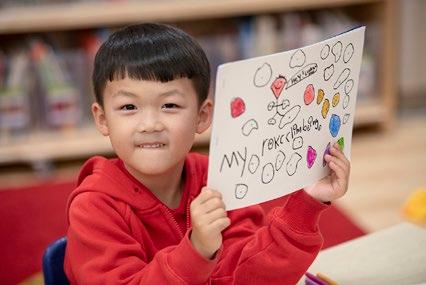
The Writing Standards focus on exposing students to three different genres: narrative, opinion and informational. In addition, the standards emphasize the need for a writing process where revision and editing take place regularly as students take their writing pieces through the complete process. Students should also participate in research and share their learning in a variety of ways.
The Speaking and Listening Standards focus on providing ample opportunities for students to take part in a variety of rich and structured conversations - as part of a whole class, in small groups or with a partner. This standard highlights the importance of learning to be productive speakers by contributing to conversations and responding to partners’ ideas.
The Language Standards focus on conventions, mechanics and syntax of Standard English. They also highlight the importance of expanding a student’s vocabulary and exploring “shadings of meaning.”
52 Hong Kong International School
RECEPTION 1 OVERVIEW
Reception 1 is a time when students build their foundational skills in all areas of literacy development. The most critical aspect is the development of language skills which encompasses speaking and listening, reading, and writing through conversations, play, and authentic experiences.
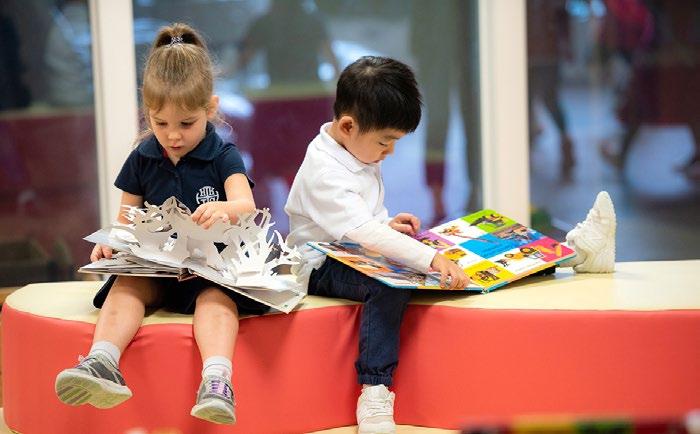
Reception 1 Overview of Big Ideas
Reading Literature and Information
With prompting and support:
• Look at books
• Chant along during reading of familiar text
• Develop understanding of text sequence such as what happens first, next and last in a familiar text
• Basic retell of a text using illustrations of a book
• Enhance children’s ability to understand stories by asking and answering questions
Writing
• Participate in making books
• Create a print-rich environment in which children are explicitly helped to understand how and why print is used
• Writing for authentic reasons (project and play)
Speaking and Listening
Oral Language
• Expand conversation and play skills
• Follow directions and develop reciprocal language
• Increase sentence length and complexity
• Build phonological awareness
• Sound awareness
• Rhyming
• Segmenting syllables, words and sentences
EXAMPLE OF POSSIBLE RECEPTION 1 UNITS
Reading:
• You Can Read Any Book, We Are All Readers
Writing:
• People Make Books and You Can Too
Lower Primary Parent Handbook 53
RECEPTION 2 OVERVIEW
The most important goal for Reception 2 students is for them to see themselves as readers and writers. Students develop comprehension skills through shared reading and read alouds. This is coupled with beginning decoding strategies and developing independence in reading. Students not only retell stories, but begin to share their own thinking about books with partners. Reception 2 writers will be introduced to the writing process. Students begin to plan and share stories about their own lives and the world around them. Students publish their writing, seeing themselves as authors.
Reception 2 Overview of Big Ideas
Reading Foundational Skills
• Segment sounds in spoken words
• Connect sounds (phonemes) to print/alphabet
• Read words with short vowels, consonants, digraphs, and blends
• Read and learn high-frequency words by examining the parts of words
• Apply phonics knowledge to decodable books and authentic literature
Reading Literature and Information
With prompting and support:
• Ask and answer questions about texts
• Identify characters and retell familiar stories
• Identify the main topic and retell key details of a text
• Describe relationships between illustrations and the text
• Engage in activities and conversations about texts
Writing
Use a combination of drawing, dictating and writing to compose:
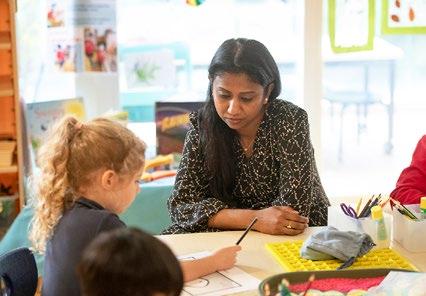
• Opinion statements about a topic
• Informational texts about a topic
• Narrative stories about a single event or series of loosely linked events
With guidance and support:
• Add details to improve writing
Speaking and Listening
• Listen to others and take turns when speaking
• Ask and answer questions in order to seek help, get information, or clarify something that is not understood
• Describe familiar people, places and events, with prompting to add additional details
• Speak audibly and express thoughts, feelings and ideas clearly
EXAMPLE OF POSSIBLE RECEPTION 2 UNITS
Reading:
• Thinking and talking about books
• Print strategies
• Bigger book, bigger reading muscles
Writing:
• How-to books
• Personal narratives
• Show and tell writing
54 Hong Kong International School
GRADE 1 OVERVIEW
Independence is a goal for Grade 1 readers and writers. Students build a toolbox of strategies to decode words while expanding their comprehension skills. Talking about books with other readers is a vital skill, sharing their own thinking about texts and adding onto the ideas of others. Grade 1 writers compose a wide variety of writing, and begin to elaborate more in order to provide more vivid mental images to their audience.
Grade 1 Overview of Big Ideas
Reading Foundational Skills
• Segment sounds in spoken words
• Continue to connect sounds (phonemes) to print
• Read words with silent-e, long vowel, and r-controlled vowel patterns
• Start to apply phonics knowledge to multi-syllabic words
• Read and learn high-frequency words by examining the parts of words
• Apply phonics knowledge to decodable books and authentic literature
Reading Literature and Information
• Ask and answer questions about key details in a text
• Retell stories and demonstrate understanding of the author's message or lesson
• Identify the main topic, retell details of a text, and explain how two events are connected
• Use text features (headings, table of contents) to locate information within
• Distinguish between information given in an illustration versus given in words
Writing
• Write opinion pieces with evidence for the rationale
• Write informational texts about a topic, including facts
• Write narrative stories that are sequenced and include some details
With guidance and support:
• Collaborate with peers to strengthen writing
• Use digital tools to produce and publish writing
• Conduct shared research by gathering information to answer a question
Speaking and Listening
• Build on others’ ideas by responding to comments of others through multiple exchanges
• Ask and answer questions about information in a text, oral presentation, or media
• Describe people, places and events with relevant details, expressing ideas and feelings
EXAMPLE OF POSSIBLE GRADE 1 UNITS
Reading:
• Building powerful habits
• Word detectives
• Reading is making meaning
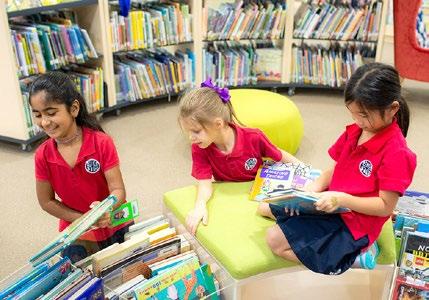
• Reading to learn about the world
• Meeting characters and learning lessons
Writing:
• Personal narratives
• Writing for readers
• Opinion writing
• Poetry
• Information chapter books
• Fiction
Lower Primary Parent Handbook 55
GRADE 2 OVERVIEW
Grade 2 readers are beginning to read longer, more complex texts. They hone their word solving skills while focusing on thinking deeply about their books. Grade 2 readers analyze characters, use text features in information books and consider the author’s lesson or purpose in writing the text. As their independence increases, second grade students read to ask and answer questions about the world around them and write to communicate opinions, stories and information.
Grade 2 Overview of Big Ideas
Reading Foundational Skills
• Segment sounds in spoken words
• Continue to connect sounds (phonemes) to print
• Complete phonics knowledge with the consonant-le syllable pattern
• Continue to apply phonics knowledge to multi-syllabic words
• Read and learn high-frequency words by examining the parts of words
• Apply phonics knowledge to decodable books and authentic literature
Reading Literature and Information
• Ask and answer questions to demonstrate understanding of a text
• Retell a variety of stories and determine author's message, lesson or moral
• Describe how characters respond to events and challenges
• Notice different points of view of characters, such as using a different voice when reading dialogue
• Identify the main topic of paragraphs and longer texts
• Make connections between a series of events, ideas, or concepts
• Describe and use of text features (headings, table of contents) to locate information in texts efficiently
Writing
• Write opinion pieces stating and supporting an opinion with rationale
• Write informational texts introducing a topic and using facts and definitions to develop ideas
• Write narrative stories using details to describe actions, thoughts and feelings
With guidance and support:
• Revise and edit to strengthen writing
Speaking and Listening
• Build on other’s talk in conversations by connecting their comments to the remarks of others
• Ask questions to clarify understanding and gather more information on a topic
EXAMPLE OF POSSIBLE GRADE 2 UNITS
Reading:
• Building a community of readers
• Readers build fluency
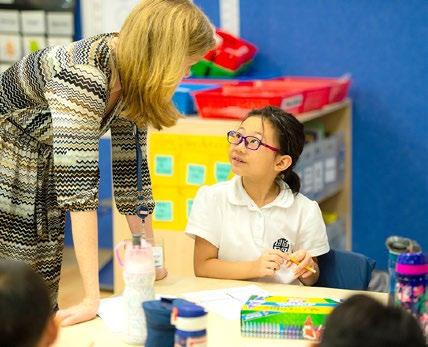
• Informational reading
• Holding onto meaning
• Characters go on journeys
Writing:
• Launching the writing workshop
• Personal narratives
• Opinion writing
• Poetry
• Informational writing
• Literary non-fiction
56 Hong Kong International School
Research-Based Literacy Instruction
In order to attain our high literacy standards, the Lower Primary utilizes many structures in literacy instruction. The key instructional strategies that make up this approach are effective in addressing the literacy needs of young learners. Our teachers utilize these strategies to ensure that the students make progress toward the benchmarks for their grade level. When visiting your child’s classroom you will see students engaged in these reading and writing activities. Teachers balance time between whole class instruction, small group instruction and individual conferences; in order to differentiate and meet the needs of all students.
HKIS Lower Primary Literacy Instruction
Reading Workshop Writing Workshop
Students receive direct, explicit instruction in decoding strategies, comprehension strategies, reading behaviors and talking and thinking strategies during daily minilessons. Students are allowed to “shop for”/choose books independently from the classroom libraries that are justright, based on student interest and a balance of both literary and informational texts. An emphasis is placed on comprehension and independence, with structures in place that allow students time to talk and share thinking with others. A “reading community” is created, where students learn to get to know themselves as readers, set reading goals for themselves, take risks and read a lot. Students are exposed to different reading genres through 3-6 week units of study across the year (about 6 units per year). Celebrations typically mark the end of a reading unit/cycle.
Interactive Read Aloud
The teacher reads aloud to the whole class or small groups from a carefully selected body of children's literature, which contains a variety of genres and represents our diverse society. As teachers read, they stop to model their thinking for students and offer students frequent opportunities to reflect on beautiful language, character traits and choices, or interesting facts learned about a topic and connections made to real life. At the end of a read aloud teachers may conduct a whole class discussion around important themes of the text. Favorite texts, selected for special features, are reread many times.
Shared Reading
Using an enlarged text so that all children can see, the teacher involves children in reading together. The process often includes reading big books, poems, songs, teacher and student writing, so that students develop concepts of print, phonemic awareness, and deeper comprehension.
Strategy Groups
The teacher works with small groups who are working towards the same reading goals/needs. Teachers provide explicit instruction to meet the needs of students learning various strategies to support their language, decoding and comprehension skills.
Students receive explicit instruction about the many different writing genres and strategies, and regularly model for students their own writing. Students then spend increasing amounts of time everyday composing and drafting their own pieces, following an authentic writing process that leads them through revision, editing and publication at the end of each writing cycle. Students are exposed to different writing genres through 4-6 week units of study across the year (about 6-7 units per year). Parents are often invited to class events, where students celebrate their published pieces.
Interactive Writing
The teacher and students work together to compose messages, letters and stories therefore practicing the planning process together. Then the text is written using a “shared pen” technique that involves children in the composition and transcription of the text. Teacher and students work together to compose text that is conventionally correct.
Phonics & Word Study
During word study, students receive direct, explicit instruction in phonics. Teachers introduce phonics concepts and strategies in a way that keeps pace with students’ reading and writing development and helps them know when, how, and why they can use phonics to help them read and write. Students also examine affixes and how they add meaning to base words. Word study is an engaging time of the day during which children inquire, learn, and play with the systems, rules, and patterns that make up the English language.
Lower Primary Parent Handbook 57
Reading and Writing Workshop and Its Components
The Lower Primary has adopted a workshop approach to teaching reading and writing. Units of study in both reading and writing are taught in approximately 4-6 weekly periods, immersing students within a particular genre and/or strategy for reading and writing. Regardless of what unit is taught, the structure of the lesson remains the same, providing students with consistency and predictability in instruction.

Mini-lessons
Mini-lessons follow a structured pattern to introduce and teach students knowledge and skills. Students are offered a chance to practice and think about what they have learned. Mini-lessons drive each unit of study forward, giving a road map for the teacher’s ongoing instruction.
Independent Time
The independent time of the workshop provides an opportunity for students to read or write independently. This independent time increases across the year and from grade-level to grade-level. During this time, students are reading independently in their “reading spots” and teachers are having conferences or leading small group instruction.
Conferences
Everyday, teachers spend time working one-on-one with students. This unique way of teaching enables them to differentiate their instruction and therefore to ensure that each student is progressing at their own rate. Teachers cycle through the whole class in approximately 1-2 weeks and are therefore able to follow up on past conferences in a timely fashion. Conferences tend to last 5-10 minutes and are focused on individual needs.
Small Group Instruction
Teachers will often notice students with common strengths and needs during the conferring time. They then can pull small groups, commonly referred to as Strategy lessons. These strategy lessons allow teachers to give additional instruction to students as needed and enable teachers to see students quite often across a 1-2 week period. Guided reading is a form of small group instruction, which takes place during reading workshop where teachers gather students with similar reading needs/ working on similar goals.
Share
A share takes place at the end of a workshop and can be both a whole class or partnership conversation. During this time, the teacher usually chooses a focus to share. Students may also have conversations around the experiences around a strategy or troubleshoot challenges encountered. The goal is that through conversation, students reach a deeper level of understanding by explaining their process and expressing their opinion. Celebrating student learning is a fundamental part of our program.
58 Hong Kong International School
Keys for Success in Reading & Writing
What the Research in Early Literacy Says
• The goals and expectations for young children’s achievement in reading and writing should be developmentally appropriate – challenging but achievable – with sufficient adult support. Rather than having a maturationist view of young children’s development, teachers in Lower Primary understand that the presence of high quality experiences throughout the early childhood years positively affects the development of literacy.
• Reading and writing acquisition is best conceptualized as a developmental continuum rather than as an all-or-nothing phenomenon. Children do not progress along this developmental continuum in rigid sequence, but instead each child exhibits a unique pattern and timing in acquiring skills and understanding related to reading and writing.
• Literacy develops within the framework of real-life activities. Teachers emphasize the meaningful or purposeful bases of early literacy and build upon what the child already knows.
• The ability to read and write well does not develop naturally, without careful planning and instruction. Children need regular and active interactions with print. The role of an adult, who is supportive, interested and engaged, provides the scaffolding for the child’s development of greater skill and understanding, is critical to this process of learning.
• The regular and systematic use of multiple ways to assess and monitor children’s progress in reading and writing development is essential to ensuring each child’s progress. In the Lower Primary, teachers assess literacy development in numerous ways throughout the year.
Reading & Writing Development An Ongoing Continuum
In the next few pages of this handbook, you will find descriptions of the first six stages of reading and writing development. This continuum, developed by Dr. Campbell Hill, provides descriptors of what children can do as they progress through each stage of development. The reading and writing continuums offer a framework for the understanding of literacy development.
It is important to remember that reading and writing development takes time. Young learners need multiple reading and writing experiences to grow as literacy learners. Adults play a crucial role in facilitating children’s development and movement along the reading and writing continuums. Children will be at different stages at different times depending on a myriad of factors. As parents, we encourage you to really celebrate what your child can do as a developing reader and writer!
As you read through the descriptions of each continuum stage, look at the children’s writing and the types of books children typically read at each stage. Think about where your child is in his or her literacy development. Notice that each page includes a Parent Tips section where you will find great ideas for supporting your child’s literacy development at home. Once you know which stage your child is at, we encourage you to try out these fun tips to help your child grow as a reader and writer.
Your child’s teacher will use this continuum throughout the school year to guide your child’s literacy development and to talk about their progress with you. Teaching children skills that are beyond their developmental stage will not help them to develop at a quicker rate. It is important to support students within their current stage of development while providing rich, stimulating experiences.
Lower Primary Parent Handbook 59
Preconventional Readers

Parent Tips:
& Read books with appealing pictures that match your child's age and interests. Children at this age like books with rhythm, repetition and rhyme.
& Encourage risk-taking as children learn to read and memorize their first books. Have your child chime in on repeated lines or a chorus.
& Take picture walks with your child and orally narrate and describe the pictures. Try to tell the story or learn new facts just by using the pictures.
Preconventional learners display curiosity about books and reading. They enjoy listening to books and may have favorites. Children focus mostly on illustrations at this stage as they talk about the story. They love songs and books with rhythm, repetition and rhyme. Students participate in reading by chiming in when adults read aloud, and children at this age often enjoy hearing the same stories read aloud over and over.
Preconventional readers are interested in environmental print, such as restaurant and traffic signs, labels and logos. Children hold books correctly, turning the pages as they look at the illustrations. They know some letter names and can read and write their first name.
Preconventional Writers
Parent Tips:
! Provide a variety of writing materials (such as different kinds of paper, pens, chalkboard, markers) and a corner or area for writing. You might want to have a writing box with paper, markers, and crayons in one convenient place.
! Model everyday writing (such as lists, letters and notes). Ask your child to add a word or picture and to talk aloud to help you plan what to write.
Preconventional readers will begin reading simple books like this one.
At the preconventional stage, children rely on their pictures to show meaning. They often pretend to write by using scribble writing. Children sometimes make random letters and numbers to represent words. Some children add "words" to their pictures to share meaning. They often tell stories about their pictures.
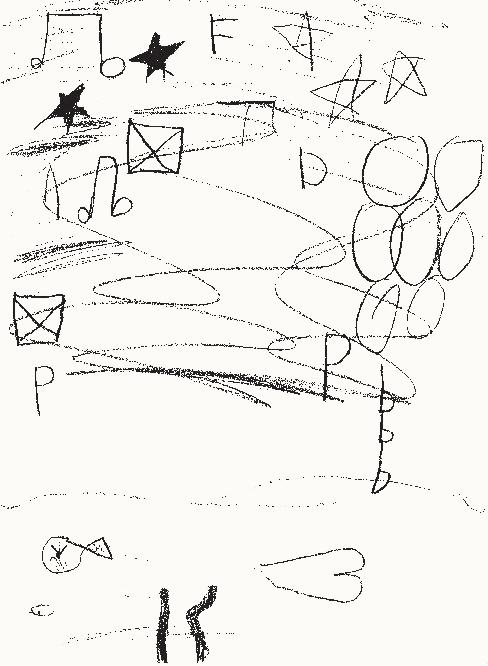
60 Hong Kong International School
Emerging Readers
Parent Tips:
& Write notes to your child (in his or her lunchbox, on the bed, on the mirror or under the pillow) using simple words.
& Continue to reread old favorites together and encourage your child to talk about his or her thinking.
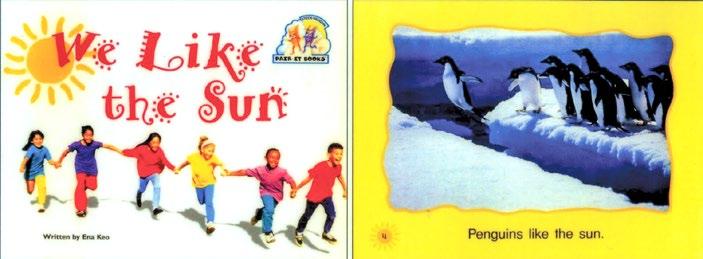
& When reading an unfamiliar text, take a picture walk first and try to “figure out” the story or learn new things about the content just by looking carefully at the pictures.
& Check out audio books from the library. Listen to them at bedtime or in the car.
At the emerging stage, children are curious about print and see themselves as potential readers. They may pretend to read familiar poems and books. Children will rely on the illustrations to tell a story, but are beginning to focus on the print. They participate in readings of familiar books and often begin to memorize favorites. Children begin to make connections between books read aloud, and their own lives and experiences. They enjoy rhyming and playing with words. Emerging readers know most letter names and some letter sounds. They recognize some names, signs and familiar words. These children are often highly motivated to learn to read and may move through this stage quickly.
Emerging Writers
Parent Tips:
! Keep a family calendar where you and your child can write down upcoming events and things to remember.
! Create a message center with a bulletin board or slots for mail. Encourage your child to write notes to members of the family.
! Always have access to a variety of drawing tools and materials.
Emerging readers will begin reading simple books like this one.
These children begin to see themselves as writers. Some students begin to label their pictures with a few letters. They may write their name and some familiar words in a way that others can read. Students may write just the beginning or the beginning and ending sounds they hear. At the emerging stage, children often write everything in upper case letters. They may pretend to read their own writing, often elaborating to embellish their stories.
This student uses beginning and ending sounds to write: I like playing. I like my friends. I have friends.

Lower Primary Parent Handbook 61
Developing Readers
Parent Tips:
& Read a variety of genres in addition to stories to find out your child's favorites (such as recipes, letters, directions, informational texts, biographies, poems).
& As you read together, ask your child to predict what might happen next, reteach or retell what has been learned so far in the text. In addition, you can talk about how the book relates to your child's life and how it compares to other books he/she has read.
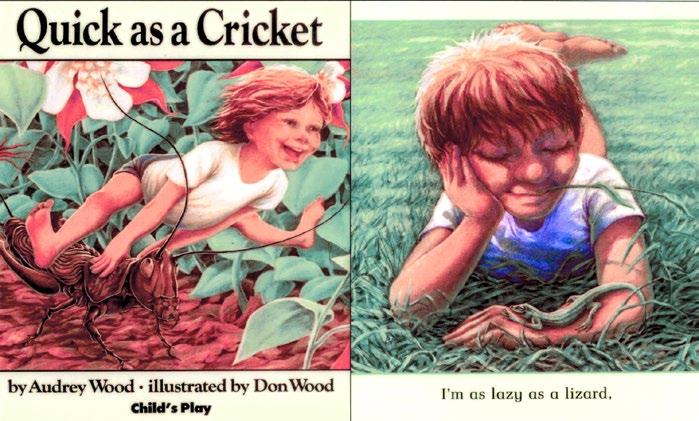
Developing Writers
Parent Tips:
! Involve your child in writing party invitations, nametags, thank you notes, valentines, holiday cards, etc. Be sure to plan so your child will have lots of time.
! Have your children send friends postcards when you're on a trip. Be sure to take stamps and their addresses with you.
These children see themselves as readers. They can read books with simple patterns, such as Dear Zoo (Rod Campell), Quick as a Cricket (Audrey Wood), or Biscuit (Alyssa Capucilli). Later in this stage they can read books with patterns that vary more, like Elephant and Piggie (Mo Willems) and Rhyming Dust Bunnies (Jan Thomas). They begin to look at books independently for short periods (5–10 minutes) and like to share books with others. Developing readers know most letter sounds and can read simple words (such as "dog" and "me") and a few sight words (such as "have" and "love"). Recognizing patterns and word families helps readers generalize what they know about one word to similar new words. They use both print and illustrations to make meaning as they read. Children often read aloud word-byword, particularly with a new text. They gain fluency with familiar books and repeated readings. These young readers can retell the main idea of a story and participate in whole group discussions of literature. This is another stage that children may pass through quickly.
Developing readers will read stories like this one.

Students at the developing stage write names and familiar words. They begin to write one or two short sentences, such as "MI DG PLS" ("My dog plays"). Developing writers use beginning, middle and ending sounds to make words. For example, learn might be written "LRn." This developmental reliance on the sounds of letters is called "invented spelling," "phonetic spelling" or "temporary spelling." At this stage, students spell some high frequency words correctly. Students often interchange upper and lower case letters and experiment with capital letters and simple punctuation. Their writing goes from left to right and begins to include spacing. Students are able to read their own compositions aloud immediately after writing, but later may not remember what they wrote.
in its basket.
62 Hong Kong International School
This developing writer uses conventional and phonetic spelling to write: My snake likes to listen to an Egyptian flute
Beginning Readers
Parent Tips:
& Begin to read series books. If you read a few, children will often read the rest of the series on their own.
& Point out ways to figure out words in addition to “reading across the word”, trying another vowel sound, looking for familiar chunks in the word, breaking the word into smaller words.
& Have conversations around favorite characters or genres in order to begin to build your child’s reading identity. Share your favorites.
Beginning Writers
Parent Tips:
! Encourage your child to email friends and relatives or start a journal or scrapbook.
! Have your child read you what he or she has written. Respond first to the content and ideas rather than focusing on spelling and punctuation. At this stage, a child's confidence and attitude about writing are very important.
! Continue to model everyday writing, as well as including your child in the composition of other types of text.
Beginning readers rely more on print than on illustrations to create meaning. When they read aloud, they understand basic punctuation, such as periods, question marks and exclamation marks. At first, they read simple early readers, like Fly Guy (Ted Arnold) and picture books with repetition, like Brown Bear, Brown Bear, What Do You See? (Bill Martin Jr.). Students take a big step forward when they learn to read longer books, like The Cat in the Hat (Dr. Seuss) or Sam and Dave Dig a Hole (Mac Barnett). Later in this stage, they can read more difficult early readers, such as Frog and Toad books (Arnold Lobel) and more challenging picture books such Duck on a Bike (David Shannon). They often enjoy simples series books, such as the Katie Woo books by Fran Manushkin or the humorous Commander Toad series by Jane Yolen. Beginning readers take a developmental leap as they begin to integrate reading strategies (meaning, sentence structure and phonics cues). These children know many words by sight and begin to correct themselves when their reading doesn't make sense. They are able to discuss the characters and events in a story with the teacher's help. When they read simple non-fiction texts, such as Mighty Spiders (Fay Robinson) or Dancing with the Manatees (Faith McNulty), they are able to talk about what they can learn. It may take significantly longer for children to move through this stage since there is a wide range of text complexity at this level.
Beginning readers who are in the later part of this stage will read books like this one.

At the beginning stage, children write recognizable short sentences with some descriptive words. They can write several sentences about their lives and experiences or simple facts about a topic. Students sometimes use capitals and periods correctly. Many letters are formed legibly and adults can usually read what the child has written. Students spell some words phonetically and others are spelled correctly. They usually spell simple words and some high frequency words correctly as they become more aware of spelling patterns. Beginning writers often start a story with "once upon a time" and finish with "The End". Children may revise by adding details with the teacher's help. They enjoy sharing their writing with others. Students may stay at this stage longer than the previous ones as they build fluency.
This beginning writer uses conventional and phonetic spelling to write:
On my holiday I went to the pool. I also went to the beach. I collected real clams. The pool was made out of sand and I swam in it! I got to hold a live crocodile at the crocodile farm. I had fun!
Lower Primary Parent Handbook 63
Expanding Readers
Parent Tips:
& Read and compare several versions of a story (such as a fairy tale or folktale)
& Encourage your child to practice reading aloud to siblings, relatives or senior citizens.
& Reading is practice for life! So have conversations with your child about the author's purpose in writing the text and connecting the text to your child's life. If fiction or realistic fiction, discuss the characters' actions and whether your child would have made the same choices.
At the expanding stage, students solidify skills as they read beginning chapter books. Many children read series books and reread old favorites while stretching into new types of reading. In the early part of this stage, they may read short series books, like Henry and Mudge or National Geographic Kids. As they build fluency, students often devour series books, like Cam Jansen (David Adler), Bailey School Kids (Debbie Dadey and Marcia Thornton Jones) or Kingdom of Wrenly (Jordan Quinn). They may also read non-fiction genres on a variety of topics such as literary non-fiction, biographies or even recipes. They read aloud fluently and are able to self-correct when they make mistakes or their reading does not make sense. They can usually figure out difficult words but are still building their reading vocabulary. At this stage, children use a variety of reading strategies independently. These students make connections between reading and writing and their own experiences. Expanding readers are able to compare characters and events from different stories. They can talk about their own reading strategies and set goals with adult help.
Expanding readers often enjoy series books like this one.

Expanding Writers
Parent Tips:
! Provide empty notebooks or blank books to use as journals or diaries.
! Make books together about trips, events, holidays and your family.
Students at this stage can write poems and stories about their experiences and interests, as well as short non-fiction pieces. They use complete sentences and their writing contains a logical flow of ideas. Their stories sometimes contain a beginning, middle and end. Expanding writers can add description, detail and interesting language with the teacher's guidance. They enjoy reading their writing aloud and are able to offer specific feedback to other students. Their editing skills begin to grow, although students may still need help as they edit for simple punctuation, spelling and grammar. Their writing is legible and they no longer labor over the physical act of writing. Students spell many common words correctly as they begin to grasp spelling patterns and rules.
64 Hong Kong International School
Here is a sample of quality titles to enjoy with your children. This is not an exhaustive list but gives an idea of books that may be interesting to students of this age.
Picture Books
Stuck
Oliver Jeffers
The Night Gardener
Terry Fan
Little Pea
Amy Krouse Rosenthal
Shortcut
Donald Crews
Chalk
Bill Thomson
Knuffle Bunny
Mo Willems
Extra Yarn
Mac Barnett
Horrible Bear!
Amy Dyckman
Poetry
Winter Bees and Other Poems of the Cold
Sidman & Allen
Where The Sidewalk Ends
Shel Silverstein
It’s Raining Pigs and Noodles
Jack Prelutsky
Water Dance
Thomas Locker
You’ll Read to Me and I’ll Read to You
Mary Ann Hoberman
Informational Books
Elephants a book for children
Steve Bloom
Ivan: The Remarkable True Story of the Shopping Mall Gorilla
Katherine Applegate
One Tiny Turtle
Nicola Davies
Gentle Giant Octopus
Karen Wallace
National Geographic Kids
Magic School Bus series
PebbleGo series
Weird But True series
Favorite Authors
Todd Parr
Mac Barnett
Amy Krouse Rosenthal
Kate DiCamillo
Cynthia Rylant
Kevin Henkes
Marla Frazee
Jon Klassen
Peter Brown
Mo Willems
Patricia Polacco
Dav Pilkey
Humor Fantasy
Franny K. Stein
Jim Benton
Ivy and Bean
Annie Barrows
Captain Underpants
Dav Pilkey
Judy Moody & Stink
Megan McDonald
The 13-Story Treehouse
Andy Griffiths
Graphic Novels Mystery
Owly
Andy Runton
Zita
Ben Hatke
Binky the Spacecat
Ashley Spires
Babymouse
Jennifer Holm
Tiny Titans
Art Baltazar & Franco
Grimm graphic novels
A-Z Mysteries
Ron Roy
Cam Jansen
David Adler
Jigsaw Jones
James Preller
Greetings From Somewhere
Harper Paris
Nancy Drew and the Clue Crew
Carolyn Keene
Kingdom of Wrenly
Jordan Quinn
Geronimo Stilton
Demetrio Bargellini
Spiderwick
Tony DiTerlizzi
Nathaniel Fludd, Beastologist
R.L. LaFevers
Time Warp Trio
John Scieszka
Magic Tree House
Mary Pope Osborne
Beloved Character Series
Mercy Watson
Kate DiCamillo
Fly Guy
Ted Arnold
Elephant and Piggie
Mo Willems
Henry and Mudge
Cynthia Rylant
Poppleton
Cynthia Rylant
Pinky and Rex
James Howe
Lower Primary Parent Handbook 65
Lower Primary School Math Guide for Parents 2023-2024
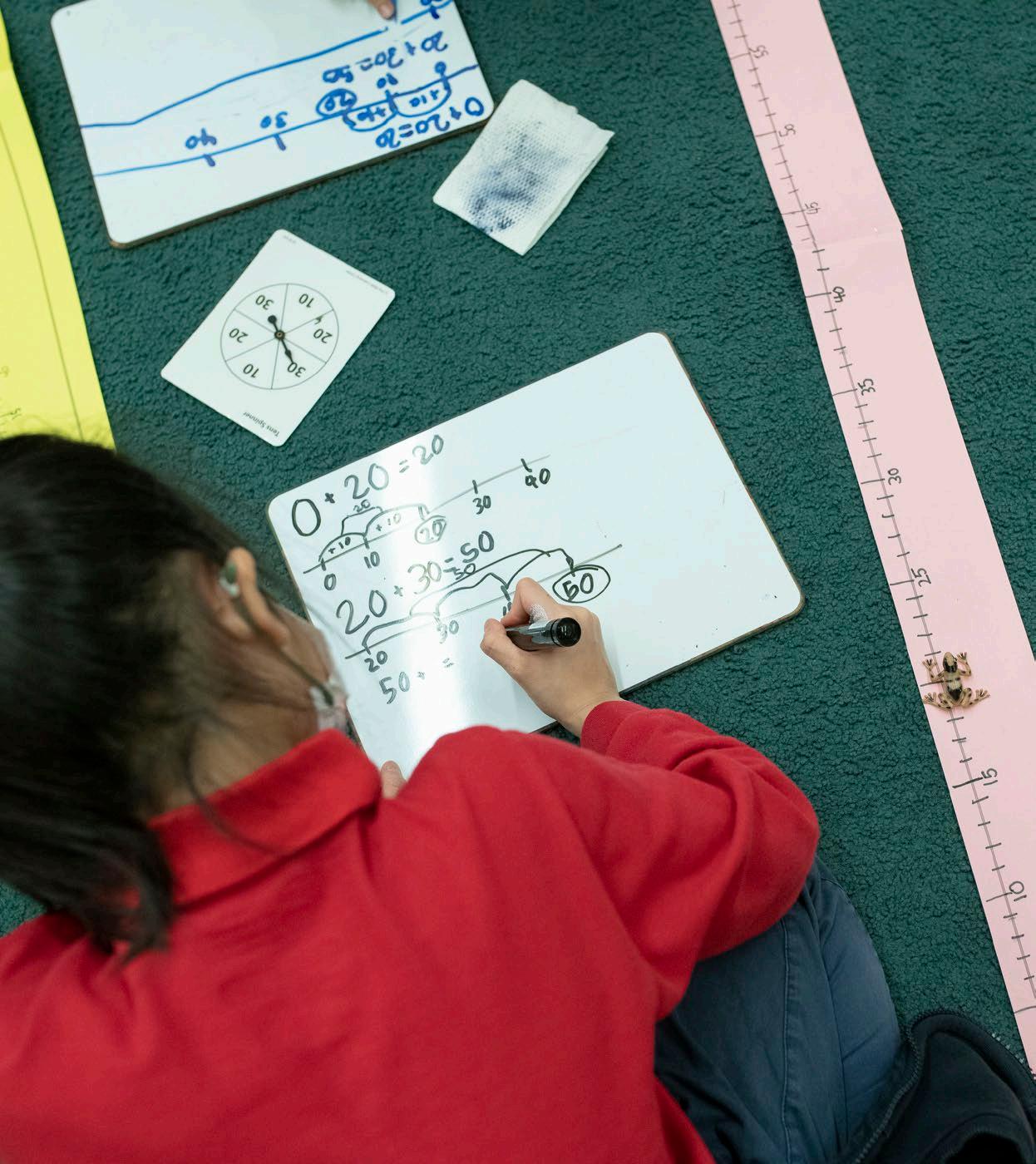
Math Curriculum in the Lower Primary
In Lower Primary, we provide an enriched, comprehensive and balanced mathematics curriculum that is developmentally appropriate for our young mathematicians. We are dedicated to teaching to the child first. Our curriculum is based on our school’s R1 to Grade 12 math philosophy and uses the Common Core State Standards as a framework for teaching and learning both content and mathematical practices. The Standards for Mathematical Practice describe strong mathematicians engaged in doing mathematics. These habits of mind have been identified by the National Council of Teachers of Mathematics and the National Research Council. The content standards concentrate on a clear set of math skills and concepts. Children will learn key skills and concepts in a focused sequence of math development. This content is delivered in ways that engages young mathematicians to be active learners and solve real-world problems. Throughout the day, our students will take time to investigate, explore, think and communicate while using a variety of mathematical tools, models and strategies.
The HKIS Math Philosophy was updated in 2016 with representatives from all divisions through a collaborative process.
HKIS Math Philosophy
R1-Grade 12 Beliefs: We believe mathematics is a universal language that allows us to make sense of fundamental principles, ideas, patterns, problems and phenomena that surround us. Through exploring abstract and contextual mathematics, students will investigate applications and uses of mathematics in the world around them. Such investigations provide opportunities for students to engage in critical thinking and reasoning. Students will learn how to communicate and justify their thinking in multiple ways. Students will come to understand that mathematicians focus on big ideas in mathematics and the connections between ideas.
Students will be able to independently and collaboratively use their learning in mathematics to:
1. Persevere and solve problems logically, creatively and confidently.
2 Reason abstractly and quantitatively.
3. Communicate thinking in a variety of situations and disciplines.
4. Demonstrate the ability to process and plan by choosing efficient strategies and effective tools and resources.
5. Apply learning in multiple ways and in familiar, unfamiliar and real world contexts.
We agree that mathematics education happens best when we provide opportunities for students to:
1. Take risks and make mistakes in an emotionally safe environment that values growth.
2. Build a conceptually based foundation that moves between concrete, symbolic and abstract, in order to develop deep understanding.
3. Reason and justify their thinking individually and with others.
4. Think creatively and critically.
5. Develop fact fluency through working with and exploring numbers in meaningful number activities.
6. Ask questions, construct knowledge and reflect on the learning process.

Lower Primary Parent Handbook 67
Five Strands of Mathematical Proficiency
In Lower Primary, we believe that students develop a deep understanding of math via exposure and practice with the Five Strands of Mathematical Proficiency. These components work together, are interwoven and interdependent and form the overarching framework for our daily math practice.

Five Strands of Mathematical Proficiency

Conceptual Understanding: High achievers in mathematics understand the meaning of the operations and underlying math concepts of all areas of mathematics.
Productive Disposition: High achievers in mathematics are persistent.
Adaptive Reasoning: High achievers in mathematics can defend their thinking and critique the reasoning of others.
Strategic Competence: High achievers in mathematics are good problem posers and problem solvers.
Procedural Fluency: High achievers in mathematics can effectively, efficiently, and flexibly choose and use a variety of strategies to compute.
Dr. Sandy Atkins. Parent Workshop “Creating High Achieving Math Students”. 2015 NRC, (2001). Adding it up. Washington, D.C.: National Academies Press.
The “Depth of Knowledge” scheme was developed by Dr. Norman Webb at the University of Wisconsin and is used in our primary math resource, “Bridges in Mathematics” as a basis for designing instruction and assessment.
Levels of Cognitive Demand
We want our young mathematicians to develop all strands of mathematical proficiency, to have conceptual understanding, procedural flexibility and fluency and the ability to apply math concepts in “real world” situations. In order to do this we are cognizant of the cognitive demand of tasks and strive to engage students in experiences that extend thinking.
Level 1: Recall and Reproduction
Recall, recognition; skill, behavior or sequence of behaviors learned through practice and easily performed (student writes 23 as twenty-three)
Level 2: Skills and Concepts
Engagement of some mental processing beyond recalling; the use of information or conceptual knowledge; requires making some decisions regarding how to approach a question or problem (student solves 45 + 29 with a place value model)
Level 3: Strategic Thinking
More sophisticated reasoning and analysis; deep understanding; students are required to solve problems and draw conclusions (student solves a two-step word problem and explains thinking using drawings, numbers and words to provide a solution that makes sense)
Level 4: Extended Thinking
Requires integration of knowledge from multiple sources and ability to represent knowledge in a variety of ways; usually requires work over an extended period of time (student collects data about height differences between second graders and middle school buddies, plots the data on a graph and makes some conclusions based on data)
68 Hong Kong International School
Standards for Mathematical Practice
This student language has been created with the help of Dr. Sandy Atkins, a math consultant for HKIS.
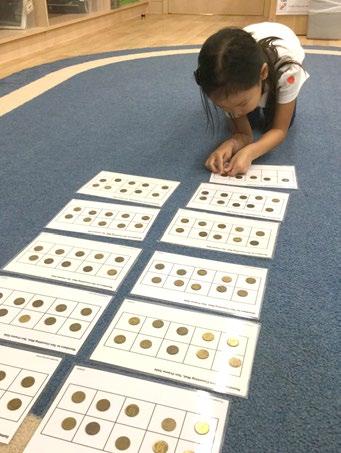
In Lower Primary, the Mathematical Practices articulated in the Common Core State Standards guide our teaching and learning. These practices describe habits of mind of productive mathematical thinkers. We help children be mathematicians by engaging in each of these practices. In class, we promote reasoning and explaining, modeling and using tools, and seeing structure and generalizing. We support our children in communicating how they explore, investigate, see, do and think math.
Standards for Mathematical Practice
1. Make sense of problems and persevere in solving them.
2. Reason abstractly and quantitatively.
Lower Primary Student Language
1. I try to understand and solve a math problem. If my first try does not work, I keep on trying until I solve it.
2. I understand the meaning of math symbols. I look for patterns, and can understand and explain with pictures, numbers and words how numbers are used.
3. Construct viable arguments and critique the reasoning of others.
3. I defend my thinking. I try to understand if the thinking of others makes sense. I ask questions to help others rethink and to grow our thinking.
4. Model with mathematics.
5. Use appropriate tools strategically.
6. Attend to precision.
7. Look for and make use of structure.
8. Look for and express regularity in repeated reasoning.
4. I can use math to show and solve problems.
5. I choose and use appropriate math tools and objects to solve problems.
6. I use precise language, objects, pictures and symbols to solve problems.
7. I use strategies and models I already know to solve problems.
8. I look for patterns and try to create and identify rules that always work to help me solve problems.
This progression from concrete to the abstract guides students’ understanding of mathematical concepts.
Four Ways to Make Thinking Visible
Concrete (Build it)
Pictorial (Draw it)
Verbal (Say it)
Symbols (Represent it)
Lower Primary Parent Handbook 69
Reception 1 Overview
In Reception 1, students are provided many opportunities to experience mathematics throughout the day. They work flexibly within a variety of situations, in both instructional and play-based contexts, in order to explore and persevere in constructing mathematical understandings.
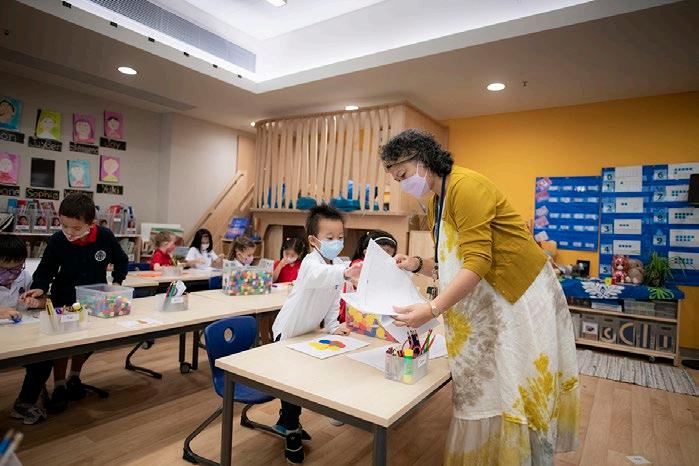

Reception 1 Overview of Big Ideas
Describe how objects are same and different: The big idea of “same and different” is explored throughout the year with familiar objects such as toys, crayons and buttons. Students will identify attributes, match, sort, compare and order a variety of objects in everyday contexts.
Demonstrate knowledge of patterns: Patterning is an extension of the big idea “same and different”. Here, children investigate and describe order in their world both qualitatively and quantitatively by identifying, replicating and extending patterns.
Explore and describe spatial relationships and shapes: Children learn the language of location to describe the relative position of themselves and objects in space. Children also explore 3-dimensional everyday objects (real-world) before being introduced to 2-dimensional objects.
Use number concepts:
• Conservation:
The big idea of conservation is an important foundational concept for number and capacity. For example, children have many opportunities to describe that moving objects around has no effect on the total number of objects.
• Counting:
Children progress from rote counting through one to one correspondence to keeping track of the number of objects counted.
• Unitizing: Students will explore how a number can be represented as a group or broken up into individual parts.
• Operations: Students will build their understanding of the meaning of the operations through stories that children can illustrate, act out or demonstrate with objects.
70 Hong Kong International School
Reception 2 Overview
In Reception 2, students focus on constructing meaning with a variety of models. More learning time is devoted to developing a strong number sense. Young mathematicians with mental images of numbers are fluent and have a strong foundation of early numeracy.
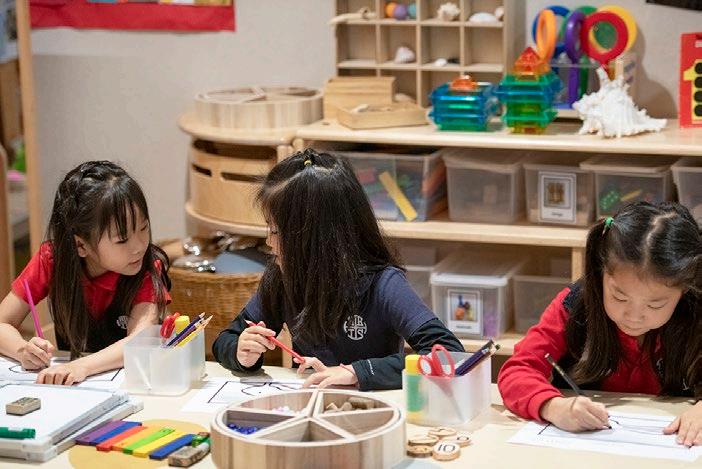
Reception 2 Overview of Big Ideas
Counting and Cardinality:
• Know number names and the count sequence
• Count to tell the number of objects
• Compare numbers
Operations and Algebraic Thinking:
• Understand addition as putting together and adding to, and understand subtraction as taking apart and taking from
Number and Operations in Base Ten:
• Work with numbers 11-19 to build foundations for place value
Measurement and Data:
• Describe and compare measurable attributes
• Classify objects and count the number of objects in categories
Geometry:
• Identifiy and describe shapes
• Analyze, compare, create and compose shapes
Lower Primary Parent Handbook 71
Grade 1 Overview
In Grade 1, students continue to build capacity as mathematicians. Continuing work with number sense develops algebraic thinking. Students use a variety of tools, manipulatives and models to construct, investigate and explore place value, and the meaning of addition and subtraction. Reasoning skills continue to be at the forefront of teaching and learning as students build communication skills.
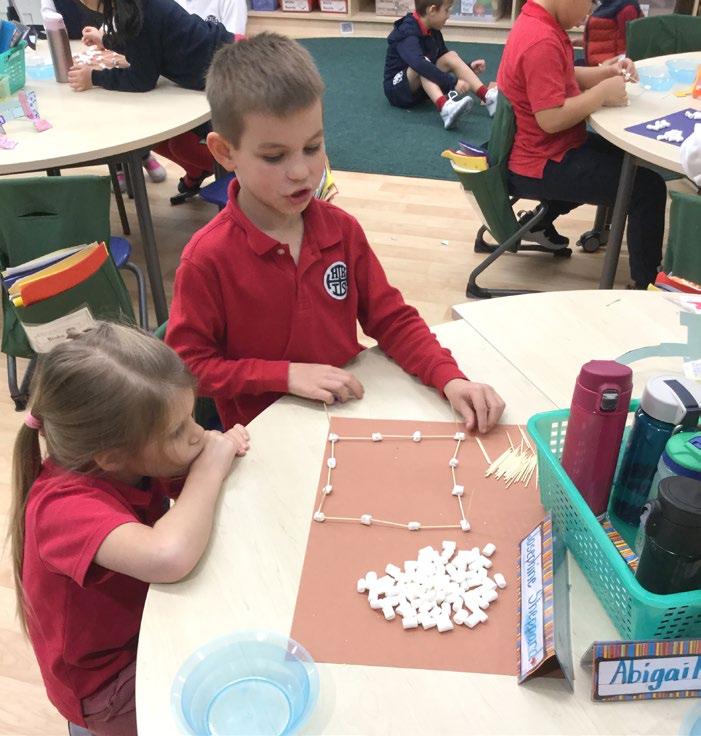
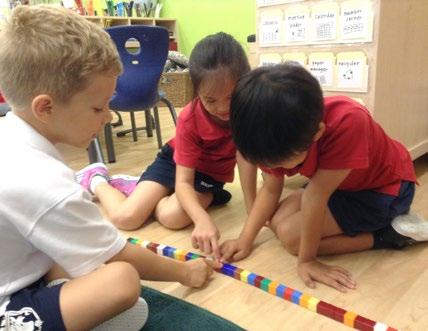
Grade 1 Overview of Big Ideas
Operations and Algebraic Thinking:
• Represent and solve problems involving addition and subtraction
• Understand and apply properties of operations and the relationship between addition and subtraction
• Work with addition and subtraction equations
Number and Operations in Base Ten:
• Extend the counting sequence
• Understand place value
• Use place value understanding and properties of operations to add and subtract
Measurement and Data:
• Measure and compare a variety of lengths with non-standard units
• Tell and write time
• Represent and interpret data
Geometry:
• Reason with shapes and their attributes
72 Hong Kong International School
Grade 2 Overview
In Grade 2, students focus on extending their understanding of the base-ten number system, build fluency with addition and subtraction, use standard units of measurement such as centimeters and describe and analyze shapes. They use objects, tools, pictures, words and symbols to show their thinking. Mental imagery continues to be important as students work with larger numbers.

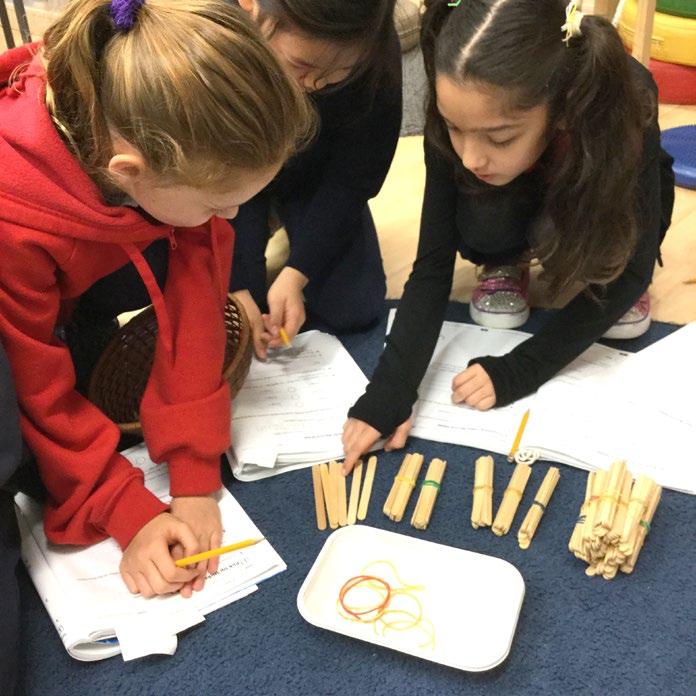
Grade 2 Overview of Big Ideas
Operations and Algebraic Thinking:
• Represent and solve problems involving addition and subtraction
• Work with equal groups of objects to gain foundations for multiplication
Number and Operations in Base Ten:
• Understand place value
• Use place value understanding and properties of operations to add and subtract
Measurement and Data:
• Measure and estimate lengths in standard units
• Relate addition and subtraction to length
• Work with time and money
• Represent and interpret data
Geometry:
• Reason with shapes and their attributes
Lower Primary Parent Handbook 73
Researched-Based Instruction
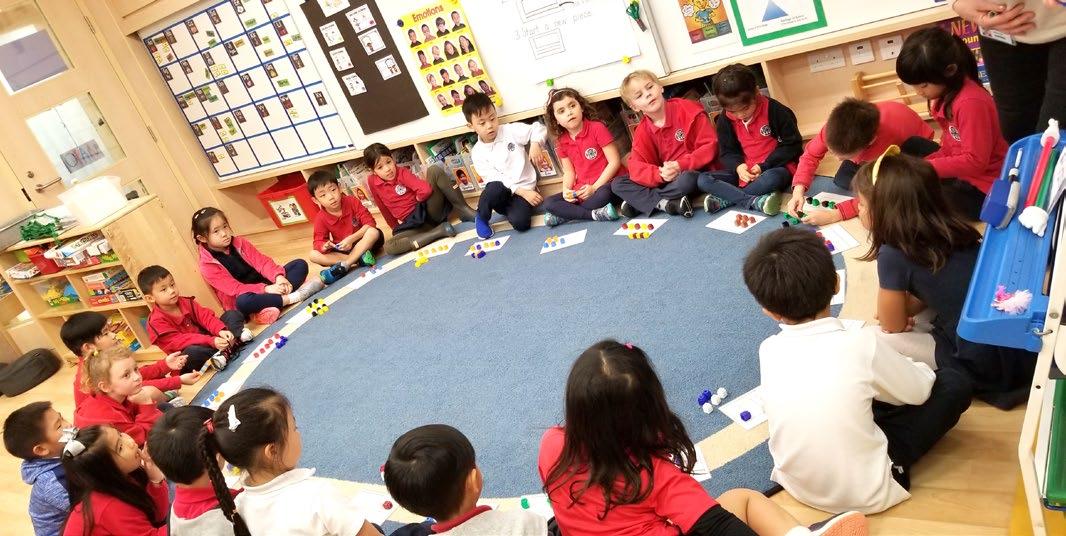
Our primary resource for developing students’ mathematical understanding is Bridges in Mathematics. The mathematics in this resource address the Common Core State Standards and is aligned to the Critical Areas of Focus and Major Instructional shifts intended by the authors of the standards. It follows a developmentally appropriate and comprehensive scope and sequence that is rigorous and engaging for our learners. Bridges in Mathematics aligns with our HKIS Math Philosophy on developing students’ deep understandings of mathematical concepts, proficiency with key skills and ability to solve complex and new problems. Children investigate and explore mathematical ideas with a variety of tools, models and strategies while building strong mathematical habits of mind.
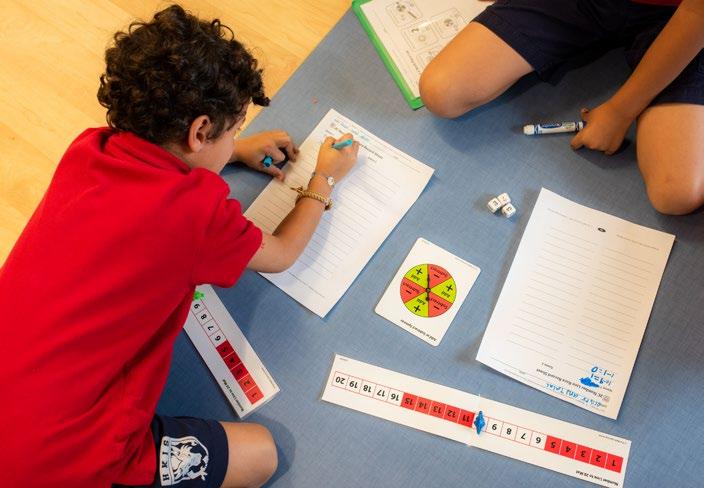
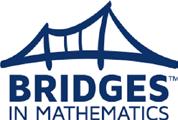
74 Hong Kong International School
2023-24 Lower Primary Six-Day Schedule
J U N E Mon Tue Wed Thu Fri 3 4 5 6 7 (B) Day 1 (B) Day 2 (B) Day 3 (B) Day 4 (B) Day 5 10 11 12 13 14 Public Holiday (B) Day 6 (A) Day 1 (A) Day 2 (A) Day 0 17 18 19 20 21 24 25 26 27 28 M A Y Mon Tue Wed Thu Fri 1 2 3 Public Holiday (B) Day 4 (B) Day 5 6 7 8 9 10 (B) Day 6 (A) Day 1 (A) Day 2 (A) Day 3 13 14 15 16 17 (A) Day 5 (A) Day 6 Public Holiday (B) Day 1 (B) Day 2 20 21 22 23 24 (B) Day 3 (B) Day 4 (B) Day 5 (B) Day 6 (A) Day 1 27 28 29 30 31 (A) Day 2 (A) Day 3 (A) Day 4 (A) Day 5 (A) Day 6 S E P T E M B E R Mon Tue Wed Thu Fri 1 (A) Day 1 4 5 6 7 8 (A) Day 2 (A) Day 3 (A) Day 4 (A) Day 5 (A) Day 6 11 12 13 14 15 (B) Day 1 (B) Day 2 (B) Day 3 (B) Day 4 18 19 20 21 22 (B) Day 5 (B) Day 6 (A) Day 1 (A) Day 2 (A) Day 3 25 26 27 28 29 (A) Day 4 (A) Day 5 (A) Day 6 (B) Day 1 (B) Day 2
A U G U S T Mon Tue Wed Thu Fri 1 2 3 4 7 8 9 10 11 14 15 16 17 18 (A) Day 0 (A) Day 1 (A) Day 2 (A) Day 3 21 22 23 24 25 (A) Day 4 (A) Day 5 (A) Day 6 (B) Day 1 (B) Day 2 28 29 30 31 (B) Day 3 (B) Day 4 (B) Day 5 (B) Day 6 F E B R U A R Y Mon Tue Wed Thu Fri 1 2 (B) Day 3 (B) Day 4 5 6 7 8 9 (B) Day 5 (B) Day 6 (A) Day 1 (A) Day 2 School Holiday 12 13 14 15 16 School Holiday (Chinese New Year) 19 20 21 22 23 (A) Day 3 (A) Day 4 (A) Day 0 (A) Day 5 (A) Day 6 26 27 28 29 (B) Day 1 (B) Day 2 (B) Day 3 (B) Day 4 M A R C H Mon Tue Wed Thu Fri 1 (B) Day 5 4 5 6 7 8 (B) Day 6 (A) Day 1 (A) Day 2 (A) Day 3 (A) Day 4 11 12 13 14 15 (A) Day 5 (A) Day 6 (A) Day 0 (B) Day 1 (B) Day 2 18 19 20 21 22 (B) Day 3 (B) Day 4 (B) Day 5 (B) Day 6 (A) Day 1 25 26 27 28 29 (A) Day 2 (A) Day 3 (A) Day 4 (A) Day 5 Public Holiday N O V E M B E R Mon Tue Wed Thu Fri 1 2 3 (B) Day 6 6 7 8 9 10 (A) Day 1 (A) Day 2 (A) Day 3 (A) Day 4 (A) Day 5 13 14 15 16 17 (A) Day 6 (B) Day 1 (B) Day 0 (B) Day 2 (B) Day 3 20 21 22 23 24 (B) Day 4 (B) Day 5 (B) Day 6 (A) Day 1 School Holiday 27 28 29 30 (A) Day 2 (A) Day 3 (A) Day 4 (A) Day 5 Parent Conferences Parent Conferences O C T O B E R Mon Tue Wed Thu Fri 2 3 4 5 6 School Holiday (Fall Break) 9 10 11 12 13 (B) Day 3 (B) Day 4 (B) Day 5 (B) Day 6 (A) Day 1 16 17 18 19 20 (A) Day 2 (A) Day 3 (A) Day 0 (A) Day 4 (A) Day 5 23 24 25 26 27 Public Holiday (A) Day 6 (B) Day 1 (B) Day 2 (B) Day 3 30 31 (B) Day 4 (B) Day 5 D E C E M B E R Mon Tue Wed Thu Fri 1 (A) Day 6 4 5 6 7 8 (B) Day 1 (B) Day 2 (B) Day 3 (B) Day 4 (B) Day 5 11 12 13 14 15 (B) Day 6 (A) Day 1 (A) Day 2 (A) Day 3 (A) Day 0 18 19 20 21 22 School Holiday (Christmas/New Year) 25 26 27 28 29 School Holiday (Christmas/New Year) J A N U A R Y Mon Tue Wed Thu Fri 1 2 3 4 5 School Holiday (Christmas/New Year) 8 9 10 11 12 (A) Day 4 (A) Day 5 (A) Day 6 (B) Day 1 (B) Day 2 15 16 17 18 19 (B) Day 3 (B) Day 4 (B) Day 5 (B) Day 6 (A) Day 1 22 23 24 25 26 (A) Day 2 (A) Day 3 (A) Day 4 (A) Day 5 29 30 31 (A) Day 6 (B) Day 1 (B) Day 2 A P R I L Mon Tue Wed Thu Fri 1 2 3 4 5 School Holiday (Spring Break) 8 9 10 11 12 (A) Day 6 (B) Day 1 (B) Day 2 (B) Day 3 (B) Day 4 15 16 17 18 19 (B) Day 5 (B) Day 6 (A) Day 1 (A) Day 2 (A) Day 3 22 23 24 25 26 (A) Day 4 (A) Day 5 (A) Day 0 (A) Day 6 (B) Day 1 29 30 (B) Day 2 (B) Day 3 Early Dismissal Half Day Last day of School Student Led Conferences Week A Week B Half Day Early Dismissal Early Dismissal Early Dismissal R1/R2 Hopes and Fears G1/G2 Start School LPS Back to School Night Professional Development Early Dismissal Professional Development R1-G2 Hopes and Fears R1/R2 Start School G1/G2 Hopes and Fears

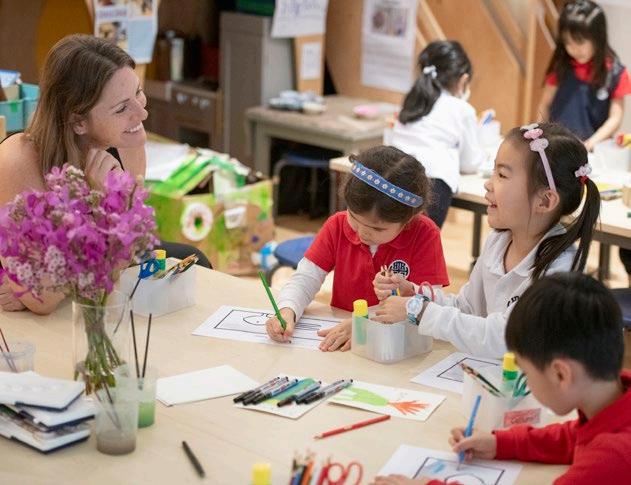
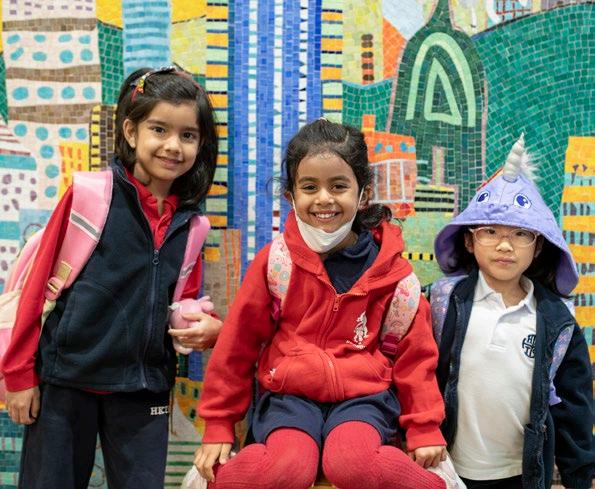
23 South Bay Close, Repulse Bay, Hong Kong T +852 2812 5000 F +852 2592 7082 www.hkis.edu.hk Lower Primary School




















































































